Morgan Godwyn
Morgan Godwyn – Trade Preferred Before Religion (1685)
During a time of increased prosecutions of those who spoke against the monarchy, one Anglican minister took to the pulpit to denounce not just the concentration of power by the kings of England, but also their involvement in the transatlantic trade in slaves.
Introduction
Morgan Godwyn was born in Gloucestershire in 1640, the son of a deeply Royalist Anglican minister who had once served as Charles I’s personal minister. Descended from a long line of Anglican clergymen—both his grandfather and great grandfather were bishops in the Church of England—Godwyn followed in his family’s footsteps and trained as a minister at Christ Church, Oxford. He happened to be there, however, in the early 1660s under the tutelage of John Locke. Godwyn graduated from Christ Church in 1665 and shortly after sailed to the colony of Virginia. After ministering for five years in two Virginia parishes he departed for Barbados, where he stayed for an additional ten years before returning to London in 1680. A year later, Godwyn became rector of Woldham, Kent, a position he quickly had to relinquish after the publication of his first major treatise, the Negro’s and Indian’s Advocate (1680), which drew criticism for its expressed support of slave conversion. A prominent Whig, Richard Newdigate, subsequently appointed Godwyn as vicar of Bulkington, Warwickshire, in 1681.
Godwyn’s exposure to the cruelties of plantation slavery deeply shaped his writings. Though no abolitionist, the Anglican minister who railed against English planters’ refusal to minister to “those Myriads of hungry and distressed Souls abroad,” as he wrote in the preface of the The Negro’s & Indians Advocate, Suing for their Admission into the Church. His second work, A Supplement to the Negro’s & Indians Advocate was published in 1681. Godwyn’s third publication was a broadside entitled The Revival, or, Directions for a sculpture describing the extraordinary care and diligence of our nation in publishing the faith among infidels in America and elsewhere, which he published in 1682. The last work that Godwyn would publish was Trade Preferr’d Before Religion. In 1685, traces of the Anglican minister mysteriously disappeared from the records.
The sermon below was first preached by Godwyn in Westminster Abbey, London, in February of 1685, shortly before the death of Charles II, with the permission of the bishop of London, Bishop Compton. Godwyn began the sermon by acknowledging the great risk he was taking by outwardly condemning a practice that was protected and promoted by the royal family. This is evident by the fact that James, Duke of York, who was the director of the Royal African Company, would soon be crowned king. The company had a monopoly over the slave trade in the British Empire and was responsible for the importation of 100,000 Africans during the decade of the 1680s alone. Godwyn continued by condemning those who practiced slavery in pursuit of wealth from trade (“mammonists”), instead of practicing religion and, in so doing, had signed a bargain with the devil. He also condemned those in England who were content to let the institution continue. After preaching at Westminster, Godwyn repeated the sentiments in several other churches before publishing the sermon. He died two years later in 1687.
Though it is not known for sure what Godwyn’s fate was after publishing the seditious document, surviving evidence indicates that Godwyn might have been imprisoned (without habeus corpus) and died as a result: certainly that was then happening to many others, as well as to Godwyn’s patrons, including not only Newdigate, but also Locke, and Bishop Compton. James II revived the old court of High Commission (abolished, along with Star Chamber, in 1641) in order to try Bishop Compton and other judges. He gave it a new name: The Commission for Ecclesiastical Causes, but it used precedents from those earlier courts.
The human costs of slavery were often overlooked in favor of economic and commercial interests. Why do you think Godwyn was so concerned about the plight of enslaved Africans ? On what grounds did he criticize English planters and their treatment of slaves? Who might be the intended audience of his sermon, and what kinds of evidence does Godwyn present for his argument?
Matt Fischer
Rachael Edmonston
Further Reading
- Wood, Betty. 2004 “Godwyn [Godwin], Morgan” Oxford Dictionary of National Biography
- Davis, David B., The Problem of Slavery in Western Culture (Oxford, 1988)
- Vaughan, Alden T., “Slaveholders’ ‘Hellish Principles’: A Seventeenth-Century Critique,” in Roots of American Racism (New York, 1995), 55-81
Sources
- Godwyn, Morgan. Trade Preferr’d before Religion, and Christ Made to Give Place to Mammon: Represented in a Sermon Relating to the Plantations. First Preached at Westminster-Abby, And Afterwards in Divers Churches in London. (London: Printed for B. Took at the Ship in St. Paul’s Church-yard, and for Isaac Cleave at the Star in Chancery-Lane, 1685.)
- Rare Books Collection ( BV2757 .G62 ), Special Collections Research Center, William & Mary Libraries
- Transcription by Michael Becker and Dylan Bails.
Cite this page
Content Warning
Some of the works in this project contain racist and offensive language and descriptions that may be difficult or disturbing to read. Please take care when reading these materials, and see our Ethics Statement and About page.
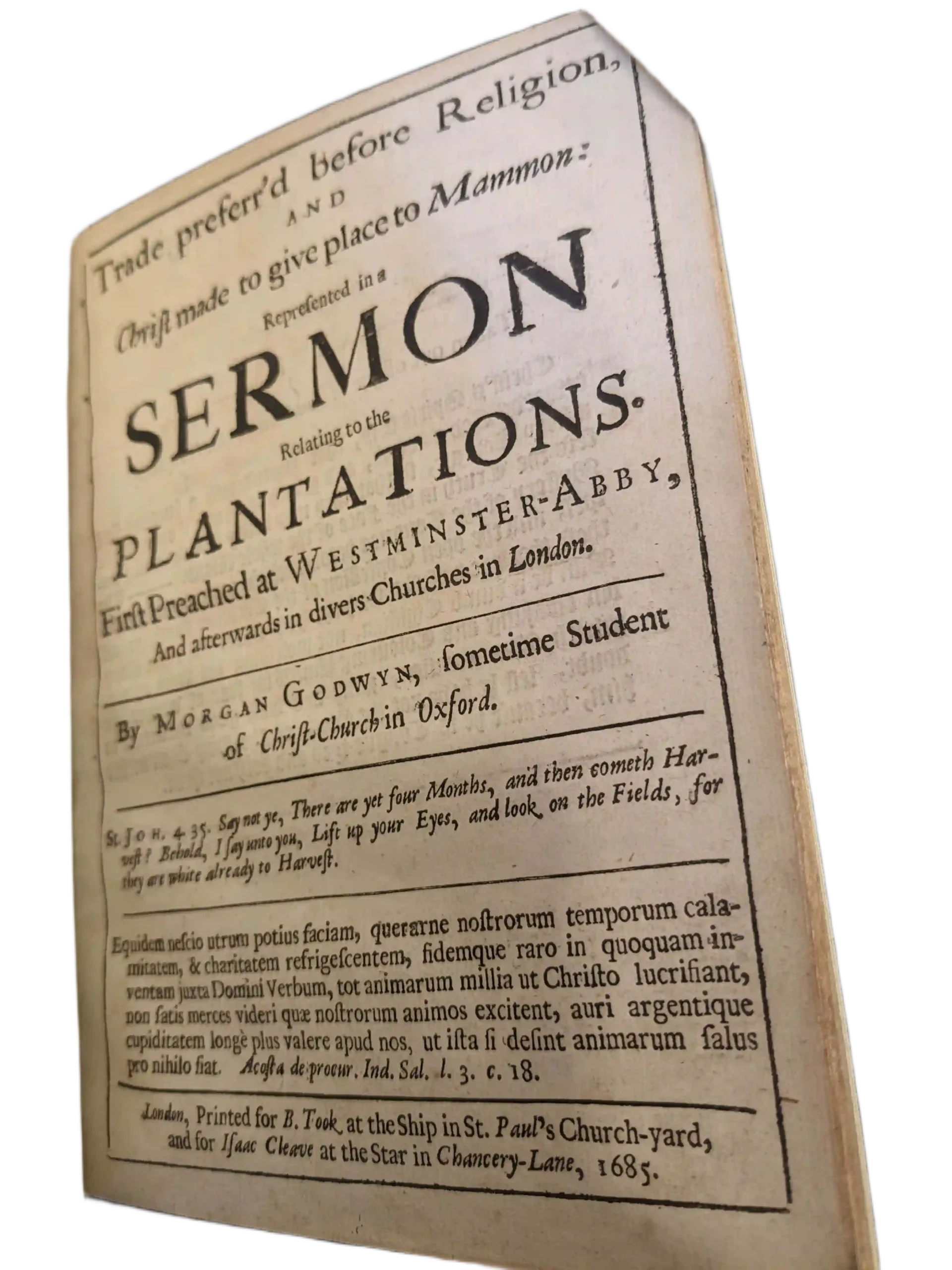
Trade preferr’d before Religion,
AND
Christ made to give place to Mammon:
Represented in a
SERMON
Relating to the
PLANTATIONS.
First Preached at WESTMINSTER-ABBY,
And afterwards in divers Churches in London.
By MORGAN GODWYN, sometime Student
of Christ-Church in Oxford.
St. JOH. 4. 35. Say not ye, There are yet four Months, and then cometh Har-
vest? Behold, I say unto you, Lift up your Eyes, and look on the Fields, for
they are white already to Harvest.
Equidem nescio utrum potius faciam, querarne nostrorum temporum cala-
mitatem, & charitatem refrigescentem, fidemque raro in quoquam in-
ventam juxta Domini Verbum, tot animarum millia ut Christo lucrifiant,
non satis merces videri quæ nostrorum animos excitent, auri argentique
cupiditatem longè plus valere apud nos, ut ista si desint animarum salus
pro nihilo fiat. Acosta de procur. Ind. Sal. l. 3. c. 18.
London, Printed for B. Took at the Ship in St. Paul‘s Church-yard,
and for Isaac Cleave at the Star in Chancery-Lane, 1685.
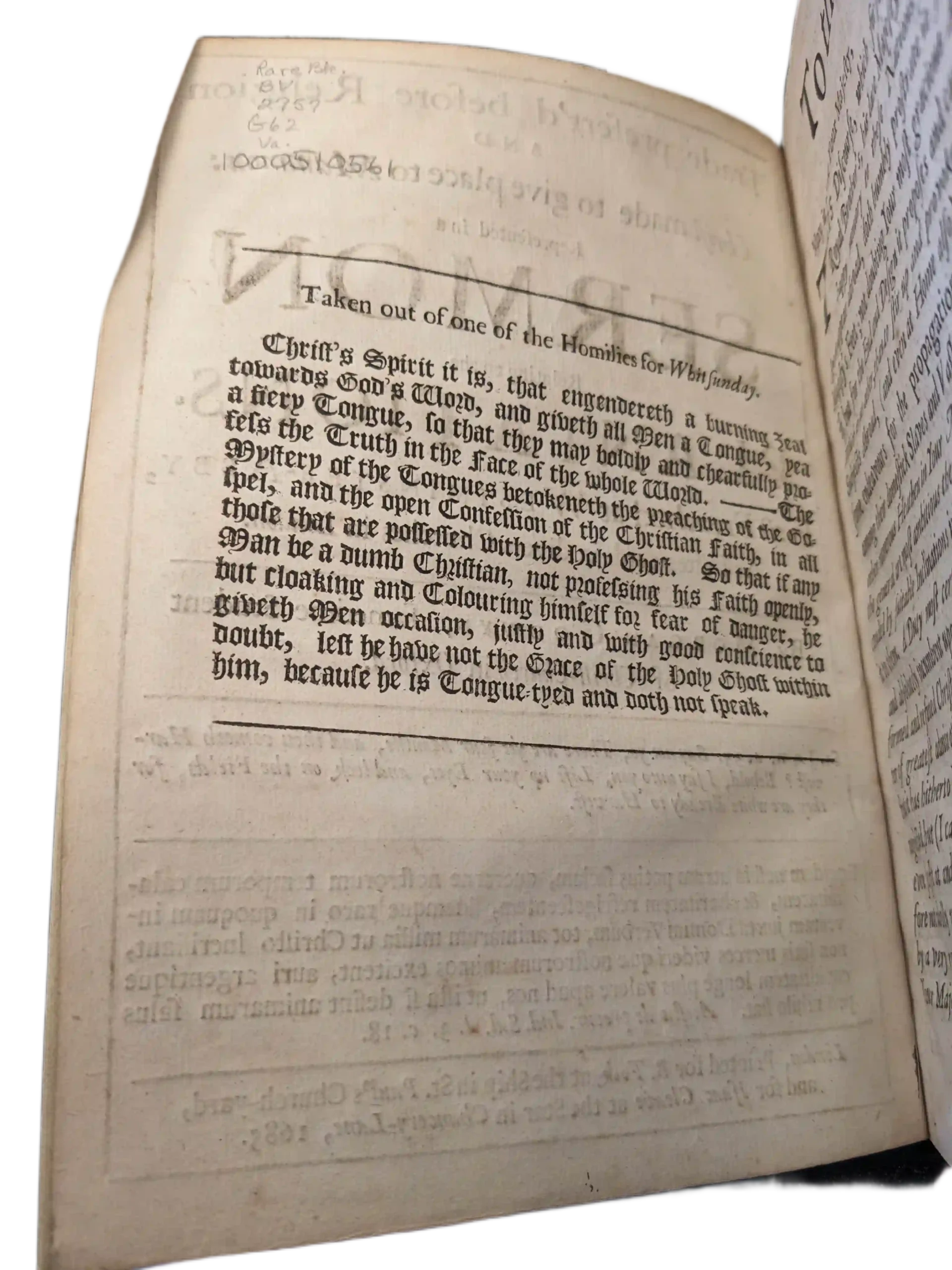
Taken out of one of the Homilies for Whitsunday.
Christ`s Spirit it is, that engendereth a burning Zeal
towards God’s Word, and giveth all Men a Tongue, yea
a fiery Tongue, so that they may boldly and chearfully pro-
fess the Truth in the Face of the whole World. — The
Mystery of the Tongues betokeneth the preaching of the Go-
spel, and the open Confession of the Christian Faith, in all
those that are possessed with the Holy Ghost. So that if any
Man be a dumb Christian, not professing his Faith openly,
but cloaking and Colouring himself for fear of danger, he
giveth Men occasion, justly and with good conscience to
doubt, lest he have not the Grace of the Holy Ghost within
him, because he is Tongue-tyed and doth not speak.
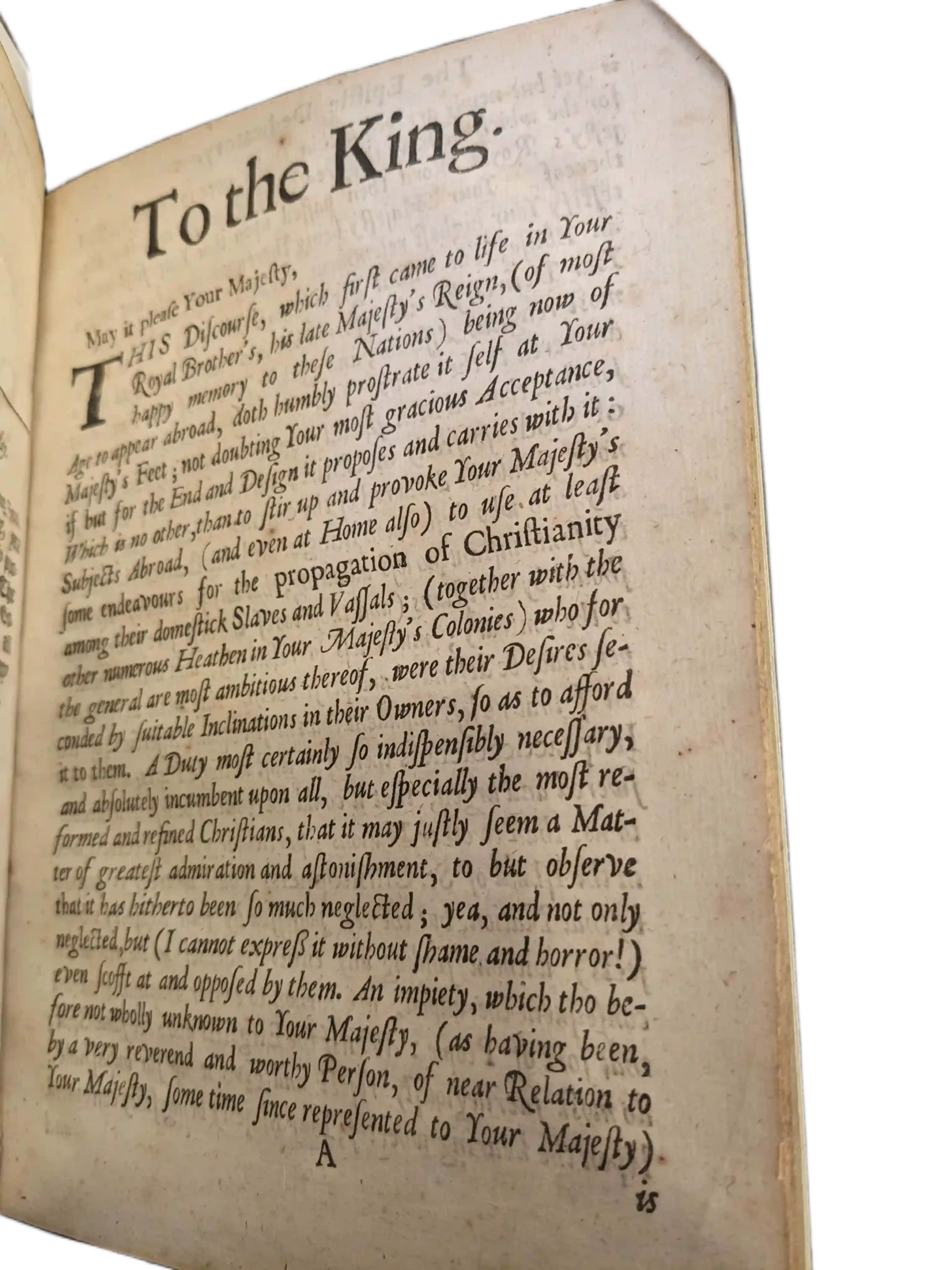
To the King.
May it please Your Majesty,
THIS Discourse, which first came to life in Your
Royal Brother’s, his late Majesty’s Reign, (of most
happy memory to these Nations) being now of
Age to appear abroad, doth humbly prostrate it self at Your
Majesty’s Feet; not doubting Your most gracious Acceptance,
if but for the End and Design it proposes and carries with it:
Which is no other, than to stir up and provoke Your Majesty’s
Subjects Abroad, (and even at Home also) to use at least
some endeavours for the propagation of Christianity
among their domestick Slaves and Vassals; (together with the
other numerous Heathen in Your Majesty’s Colonies) who for
the general are most ambitious thereof, were their Desires se-
conded by suitable Inclinations in their Owners, so as to afford
it to them. A Duty most certainly so indispensibly necessary,
and absolutely incumbent upon all, but especially the most re-
formed and refined Christians, that it may justly seem a Mat-
ter of greatest admiration and astonishment, to but observe
that it has hitherto been so much neglected; yea, and not only
neglected, but (I cannot express it without shame and horror!)
even scofft at and opposed by them. An impiety, which tho be-
fore not wholly unknown to Your Majesty, (as having been,
by a very reverend and worthy Person, of near Relation to
Your Majesty, some time since represented to Your Majesty)
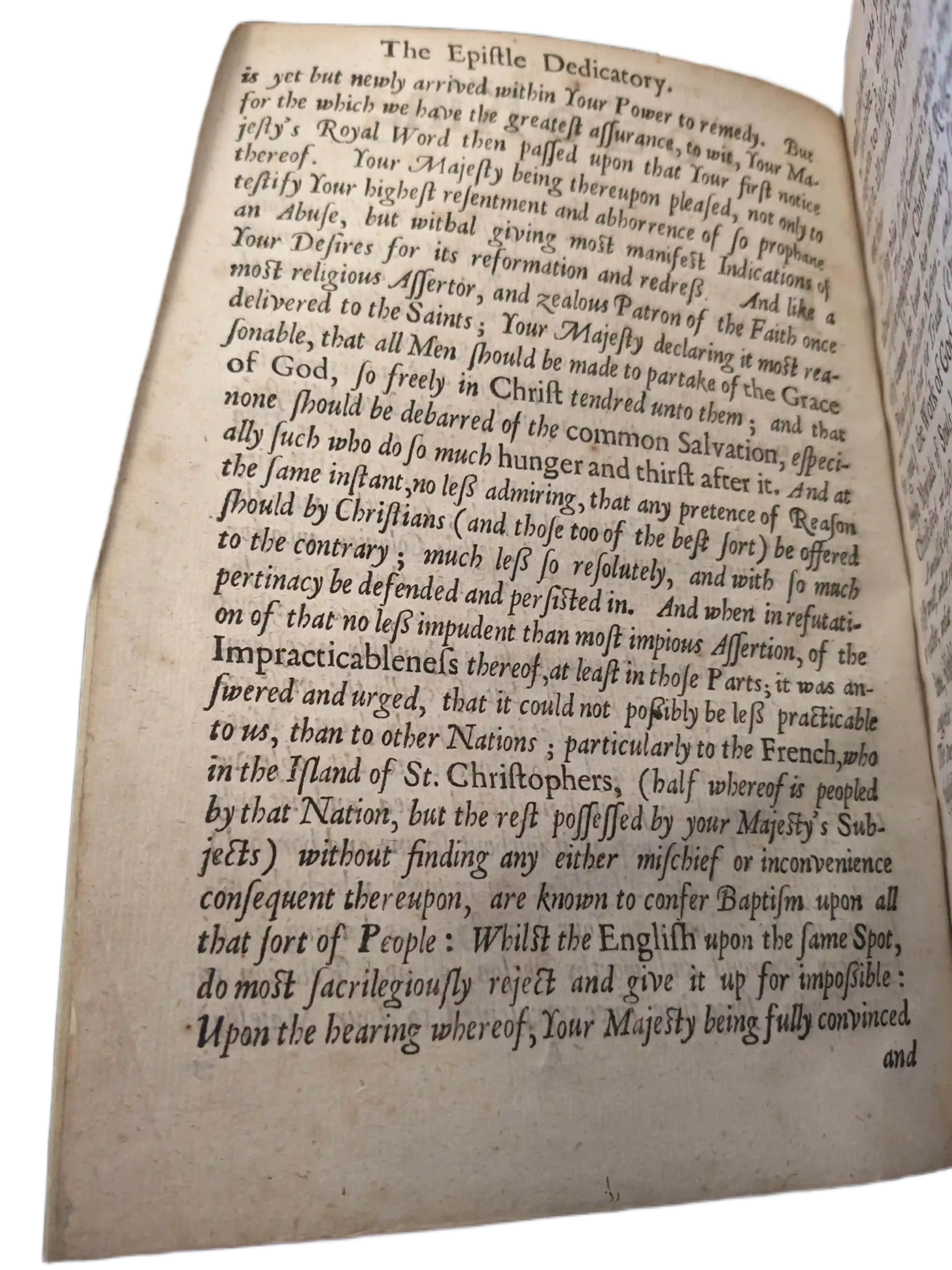
is yet but newly arrived within Your Power to remedy. But
for the which we have the greatest assurance, to wit, Your Ma-
jesty’s Royal Word then passed upon that Your first notice
thereof. Your Majesty being thereupon pleased, not only to
testify Your highest resentment and abhorrence of so prophane
an Abuse, but withal giving most manifest Indications of
Your Desires for its reformation and redress. And like a
most religious Assertor, and zealous Patron of the Faith once
delivered to the Saints; Your Majesty declaring it most rea-
sonable, that all Men should be made to partake of the Grace
of God, so freely in Christ tendred unto them; and that
none should be debarred of the common Salvation, especi-
ally such who do so much hunger and thirst after it. And at
the same instant, no less admiring, that any pretence of Reason
should by Christians (and those too of the best sort) be offered
to the contrary; much less so resolutely, and with so much
pertinacy be defended and persisted in. And when in refutati-
on of that no less impudent than most impious Assertion, of the
Impracticableness thereof, at least in those Parts; it was an-
swered and urged, that it could not possibly be less practicable
to us, than to other Nations; particularly to the French, who
in the Island of St. Christophers, (half whereof is peopled
by that Nation, but the rest possessed by your Majesty’s Sub-
jects) without finding any either mischief or inconvenience
consequent thereupon, are known to confer Baptism upon all
that sort of People: Whilst the English upon the same Spot,
do most sacrilegiously reject and give it up for impossible:
Upon the hearing whereof, Your Majesty being fully convinced
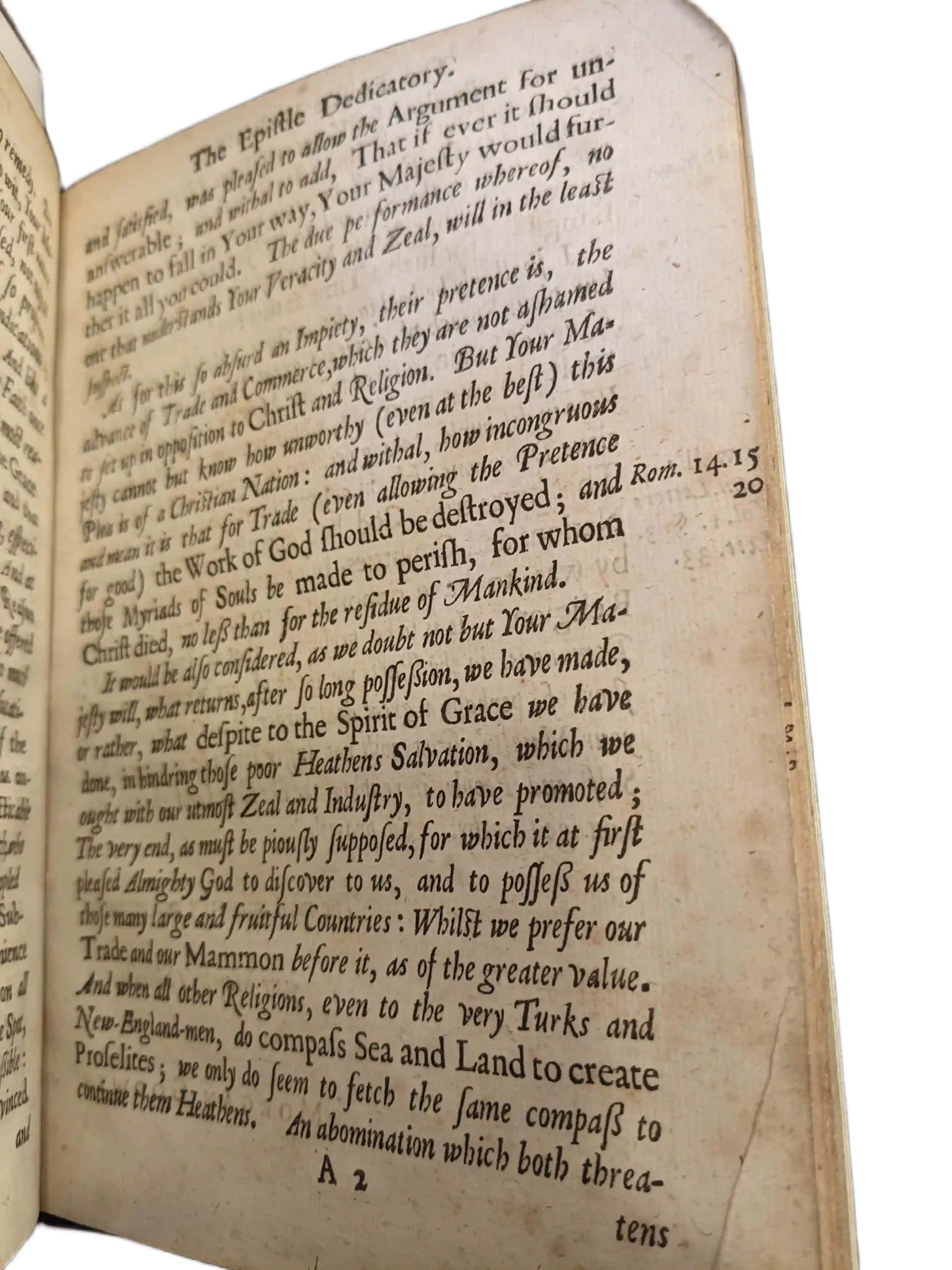
and satisfied, was pleased to allow the Argument for un-
answerable; and withal to add, That if ever it should
happen to fall in Your way, Your Majesty would fur-
ther it all you could. The due performance whereof, no
one that understands Your Veracity and Zeal, will in the least
suspect.
As for this so absurd an Impiety, their pretence is, the
advance of Trade and Commerce, which they are not ashamed
to set up in opposition to Christ and Religion. But Your Ma-
jesty cannot but know how unworthy (even at the best) this
Plea is of a Christian Nation: and withal, how incongruous
and mean it is that for Trade (even allowing the Pretence
for good) the Work of God should be destroyed; 1Rom. 14. 15, 20. and
those Myriads of Souls be made to perish, for whom
Christ died, no less than for the residue of Mankind.
It would be also considered, as we doubt not but Your Ma-
jesty will, what returns, after so long possession, we have made,
or rather, what despite to the Spirit of Grace we have
done, in hindring those poor Heathens Salvation, which we
ought with our utmost Zeal and Industry, to have promoted;
The very end, as must be piously supposed, for which it at first
pleased Almighty God to discover to us, and to possess us of
those many large and fruitful Countries: Whilst we prefer our
Trade and our Mammon before it, as of the greater value.
And when all other Religions, even to the very Turks and
New-England-men, do compass Sea and Land to create
Proselites; we only do seem to fetch the same compass to
continue them Heathens. An abomination which both threa-
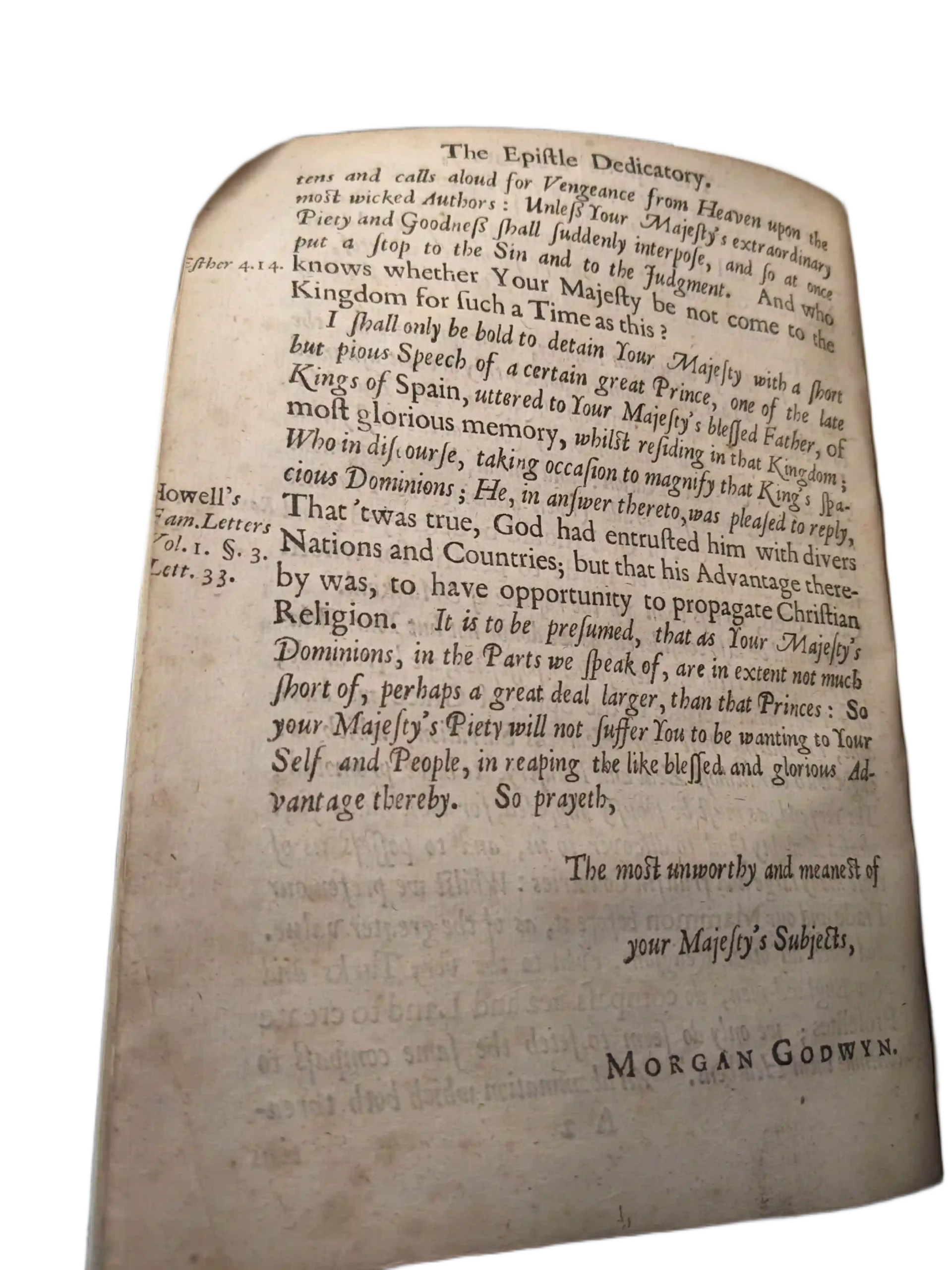
tens and calls aloud for Vengeance from Heaven upon the
most wicked Authors: Unless Your Majesty’s extraordinary
Piety and Goodness shall suddenly interpose, and so at once
put a stop to the Sin and to the Judgment. And who
knows whether Your Majesty be not come to the
Kingdom for such a Time as this?2Esther 4.14.
I shall only be bold to detain Your Majesty with a short
but pious Speech of a certain great Prince, one of the late
Kings of Spain, uttered to Your Majesty`s blessed Father, of
most glorious memory, whilst residing in that Kingdom;
Who in discourse, taking occasion to magnify that King’s spa-
cious Dominions; He, in answer thereto, was pleased to reply,
That ’twas true, 3Howell’s Fam. Letters Vol. I. §. 3. Lett. 33. God had entrusted him with divers
Nations and Countries; but that his Advantage there-
by was, to have opportunity to propagate Christian
Religion. It is to be presumed, that as Your Majesty`s
Dominions, in the Parts we speak of, are in extent not much
short of, perhaps a great deal larger, than that Princes: So
your Majesty’s Piety will not suffer You to be wanting to Your
Self and People, in reaping the like blessed and glorious Ad-
vantage thereby. So prayeth,
The most unworthy and meanest of
Your Majesty`s Subjects,
MORGAN GODWYN.
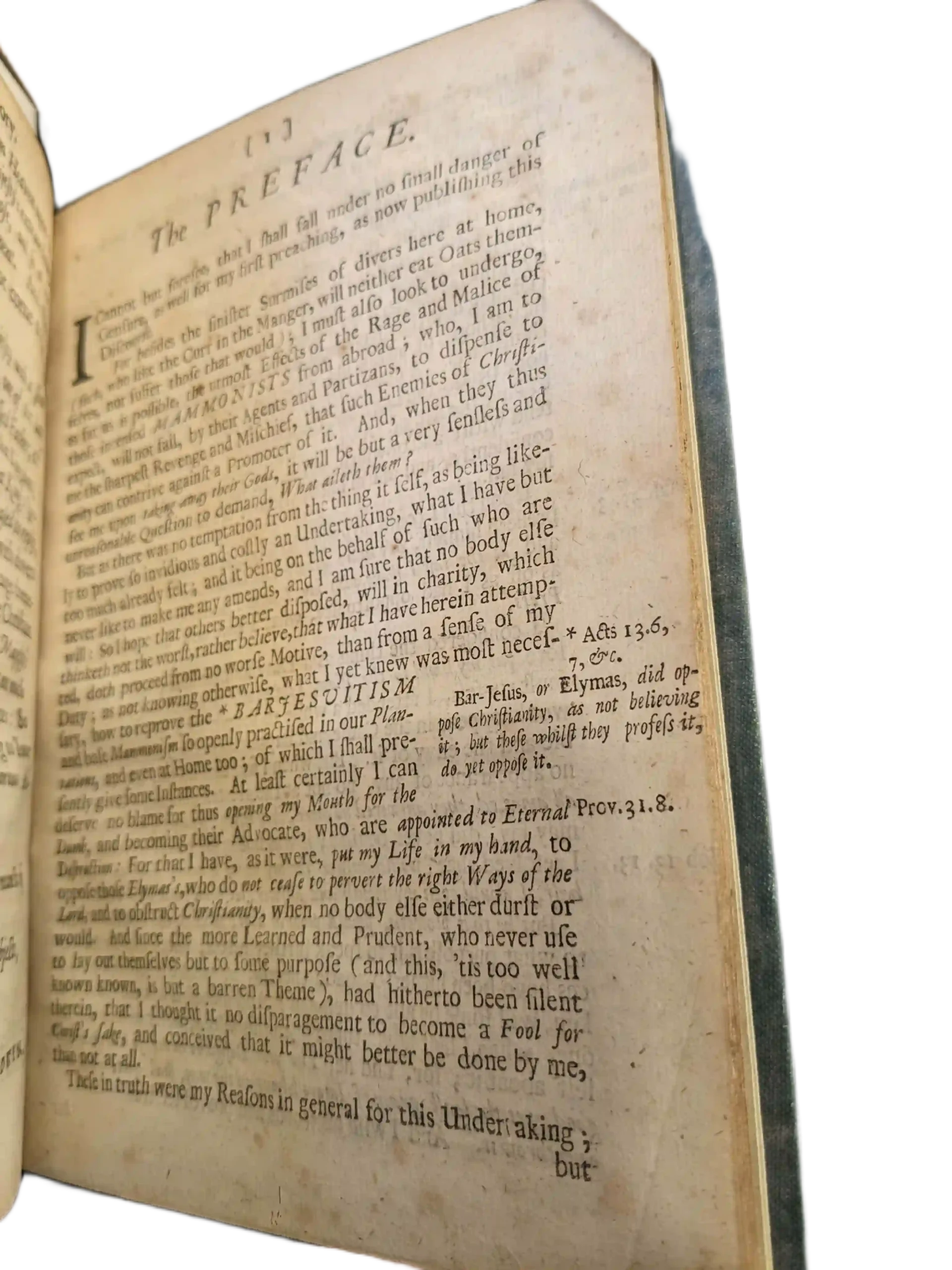
[1]
The PREFACE.
I Cannot but foresee, that I shall fall under no small danger of
Censure, as well for my first preaching, as now publishing this
Discourse.
For besides the sinister Surmises of divers here at home,
(such, who like the Curr in the Manger, will neither eat Oats them-
selves, nor suffer those that would); I must also look to undergo,
as far as is possible, the utmost Effects of the Rage and Malice of
those incensed MAMMONISTS from abroad; who, I am to
expect, will not fail, by their Agents and Partizans, to dispense to
me the sharpest Revenge and Mischief, that such Enemies of Christi-
anity can contrive against a Promoter of it. And, when they thus
see me upon taking away their Gods, it will be but a very sensless and
unreasonable Question to demand, What aileth them?
But as there was no temptation from the thing it self, as being like-
ly to prove so invidious and costly an Undertaking, what I have but
too much already felt; and it being on the behalf of such who are
never like to make me any amends, and I am sure that no body else
will: So I hope that others better disposed, will in charity, which
thinketh not the worst, rather believe, that what I have herein attemp-
ted, doth proceed from no worse Motive, than from a sense of my
Duty; as not knowing otherwise, what I yet knew was most neces-
sary, how to reprove the 4Acts 13.6, & &c. Bar-Jesus, or Elymas, did oppose Christianity, as not believing it; but these whilst they profess it, do yet oppose it. BARJESUITISM
and base Mammonism so openly practised in our Plan-
tations, and even at Home too; of which I shall pre-
sently give some Instances. At least certainly I can
deserve no blame for thus opening my Mouth for the
Dumb, 5Prov. 31. 8. and becoming their Advocate, who are appointed to Eternal
Destruction: For that I have, as it were, put my Life in my hand, to
oppose those Elymas`s, who do not cease to pervert the right Ways of the
Lord, and to obstruct Christianity, when no body else either durst or
would. And since the more Learned and Prudent, who never use
to lay out themselves but to some purpose (and this, ’tis too well
known known, is but a barren Theme), had hitherto been silent
therein, that I thought it no disparagement to become a Fool for
Christ’s sake, and conceived that it might better be done by me,
than not at all.
These in truth were my Reasons in general for this Undertaking;
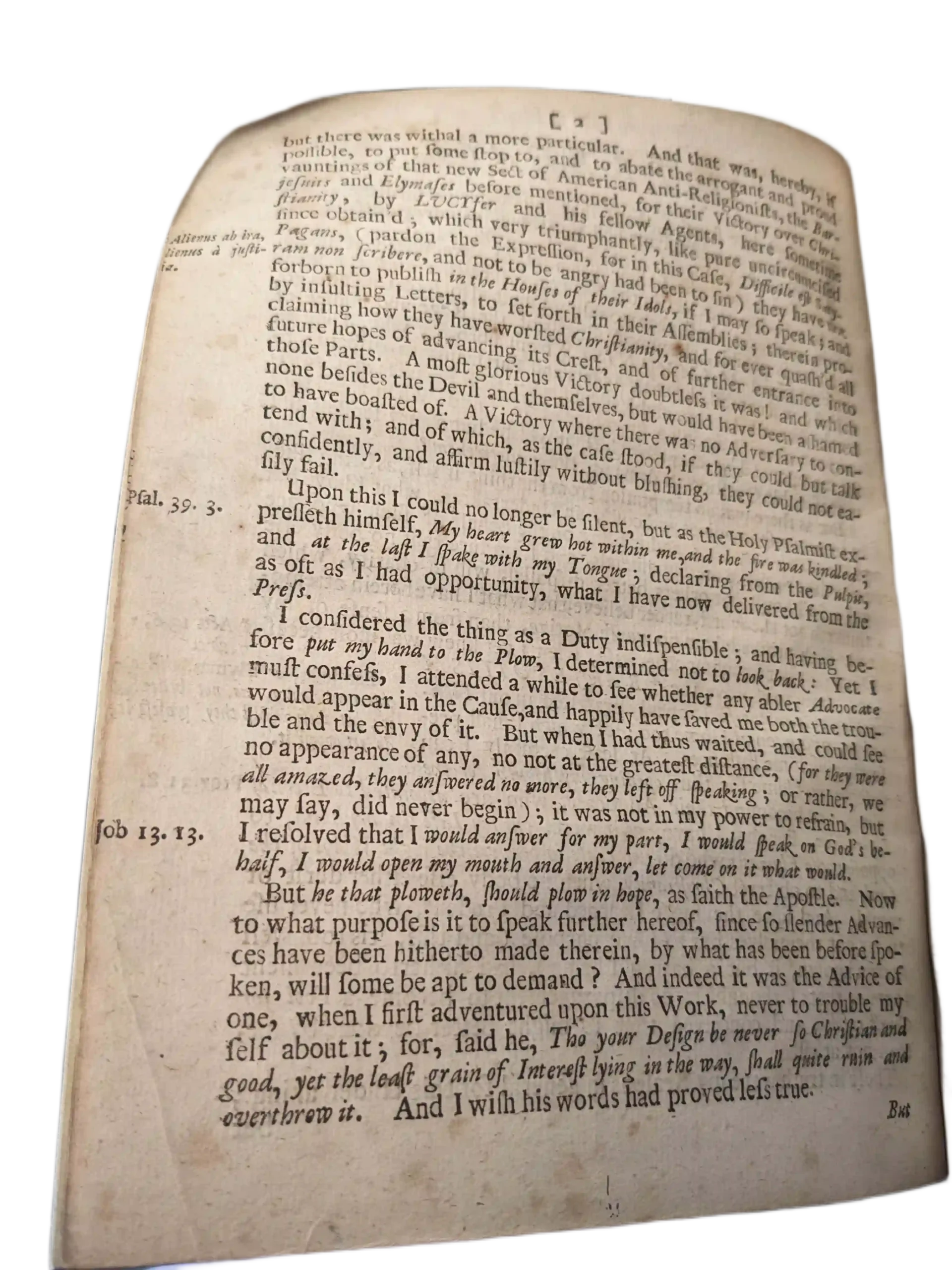
[2]
but there was withal a more particular. And that was, hereby, if
possible, to put some stop to, and to abate the arrogant and proud
vauntings of that new Sect of American Anti-Religionists, the Bar-
jesuits and Elymases before mentioned, for their Victory over Chri-
stianity, by LUCYfer and his fellow Agents, here sometime
since obtain’d; which very triumphantly, like pure uncircumcised
Pagans 6Alienus ab ira, alienus à justitia, (pardon the Expression, for in this Case, Difficile est Saty-
ram non scribere, and not to be angry had been to sin) they have not
forborn to publish in the Houses of their Idols, if I may so speak; and
by insulting Letters, to set forth in their Assemblies; therein pro-
claiming how they have worsted Christianity, and for ever quash’d all
future hopes of advancing its Crest, and of further entrance into
those Parts. A most glorious Victory doubtless it was! and which
none besides the Devil and themselves, but would have been ashamed
to have boasted of. A Victory where there was no Adversary to con-
tend with; and of which, as the case stood, if they could but talk
confidently, and affirm lustily without blushing, they could not ea-
sily fail.
Upon this I could no longer be silent, but as the Holy Psalmist ex-
presseth himself, 7Psal. 39. 3. My heart grew hot within me, and the fire was kindled;
and at the last I spake with my Tongue; declaring from the Pulpit,
as oft as I had opportunity, what I have now delivered from the
Press.
I considered the thing as a Duty indispensible; and having be-
fore put my hand to the Plow, I determined not to look back: Yet I
must confess, I attended a while to see whether any abler Advocate
would appear in the Cause, and happily have saved me both the trou-
ble and the envy of it. But when I had thus waited, and could see
no appearance of any, no not at the greatest distance, (for they were
all amazed, they answered no more, they left off speaking; or rather, we
may say, did never begin); it was not in my power to refrain, but
I resolved that I would answer for my part, 8Job 13. 13. I would speak on God’s be-
half, I would open my mouth and answer, let come on it what would.
But he that ploweth, should plow in hope, as saith the Apostle. Now
to what purpose is it to speak further hereof, since so slender Advan-
ces have been hitherto made therein, by what has been before spo-
ken, will some be apt to demand? And indeed it was the Advice of
one, when I first adventured upon this Work, never to trouble my
self about it; for, said he, Tho your Design be never so Christian and
good, yet the least grain of Interest lying in the way, shall quite ruin and
overthrow it. And I wish his words had proved less true.
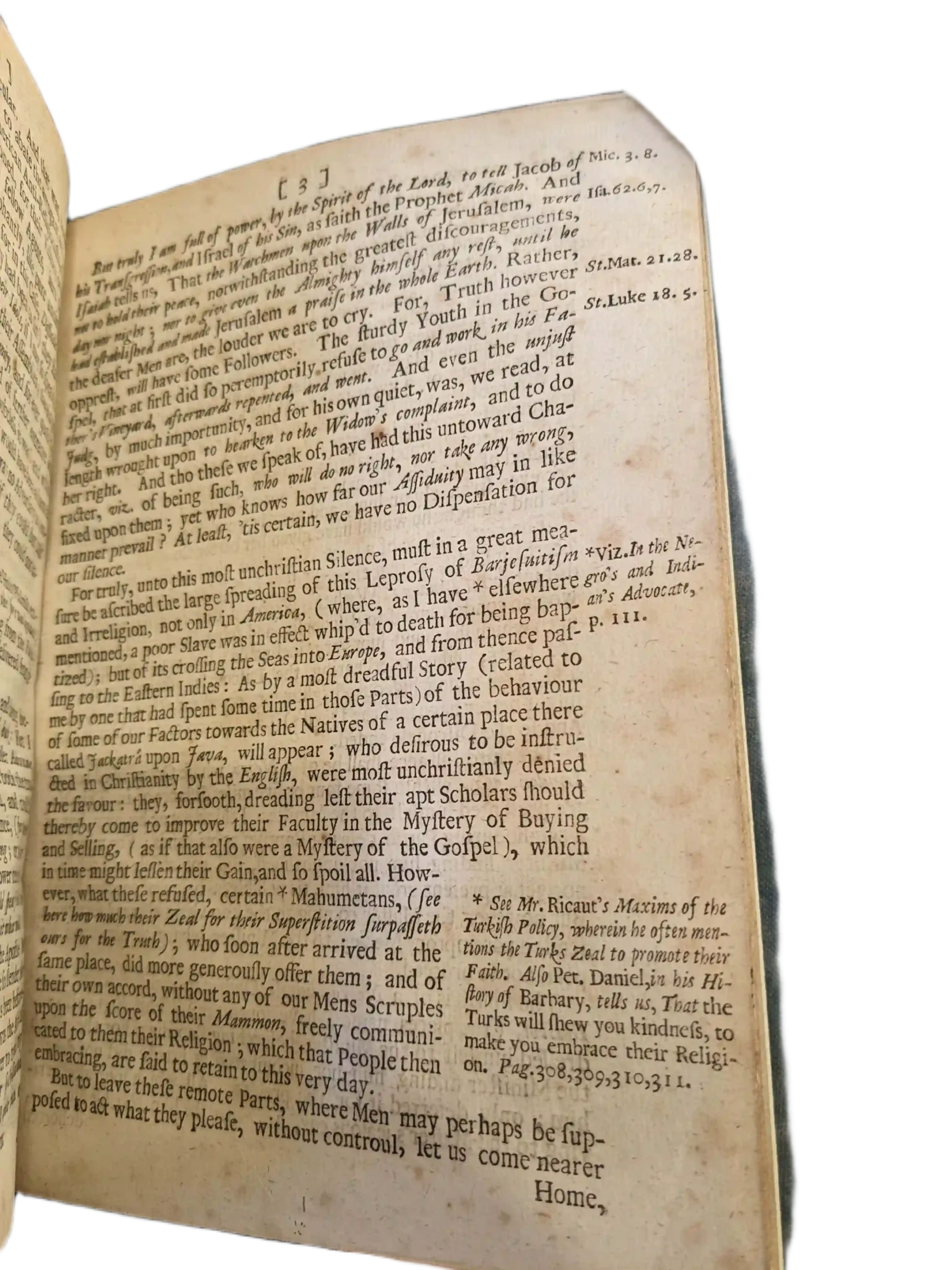
[3]
But truly I am full of power, 9Mic. 3. 8. by the Spirit of the Lord, to tell Jacob of
his Transgression, and Israel of his Sin, as saith the Prophet Micah. And
Isaiah tells us, 10Isa. 62.6,7. That the Watchmen upon the Walls of Jerusalem, were
not to hold their peace, notwithstanding the greatest discouragements,
day nor night; nor to give even the Almighty himself any rest, until he
had established and made Jerusalem a praise in the whole Earth. Rather,
the deafer Men are, 11St. Mat. 21. 28. the louder we are to cry. For, Truth however
opprest, will have some Followers. The sturdy Youth in the Go-
spel, 12 St. Luke 18. 5. that at first did so peremptorily refuse to go and work in his Fa-
ther’s Vineyard, afterwards repented, and went. And even the unjust
Judg, by much importunity, and for his own quiet, was, we read, at
length wrought upon to hearken to the Widow`s complaint, and to do
her right. And tho these we speak of, have had this untoward Cha-
racter, viz. of being such, who will do no right, nor take any wrong,
fixed upon them; yet who knows how far our Assiduity may in like
manner prevail? At least, ’tis certain, we have no Dispensation for
our silence.
For truly, unto this most unchristian Silence, must in a great mea-
sure be ascribed the large spreading of this Leprosy of Barjesuitism
and Irreligion, not only in America, (where, as I have 13 Viz. In the Negro`s and Indian`s Advocate, p. 111. elsewhere
mentioned, a poor Slave was in effect whip’d to death for being bap-
tized); but of its crossing the Seas into Europe, and from thence pas-
sing to the Eastern Indies: As by a most dreadful Story (related to
me by one that had spent some time in those Parts) of the behaviour
of some of our Factors towards the Natives of a certain place there
called Jackatrâ upon Java, will appear; who desirous to be instru-
cted in Christianity by the English, were most unchristianly denied
the favour: they, forsooth, dreading lest their apt Scholars should
thereby come to improve their Faculty in the Mystery of Buying
and Selling, (as if that also were a Mystery of the Gospel), which
in time might lessen their Gain, and so spoil all. How-
ever, what these refused, certain 14See Mr. Ricaut’s Maxims of the Turkish Policy, wherein he often mentions the Turks Zeal to promote their Fath. Also Pet. Daniel, in his History of Barbary, tells us, That the Turks will shew you kindness, to make you embrace their Religion. Pag. 308, 309, 310, 311. Mahumetans, (see
here how much their Zeal for their Superstition surpasseth
ours for the Truth); who soon after arrived at the
same place, did more generously offer them; and of
their own accord, without any of our Mens Scruples
upon the score of their Mammon, freely communi-
cated to them their Religion; which that People then
embracing, are said to retain to this very day.
But to leave these remote Parts, where Men may perhaps be sup-
posed to act what they please, without controul, let us come nearer
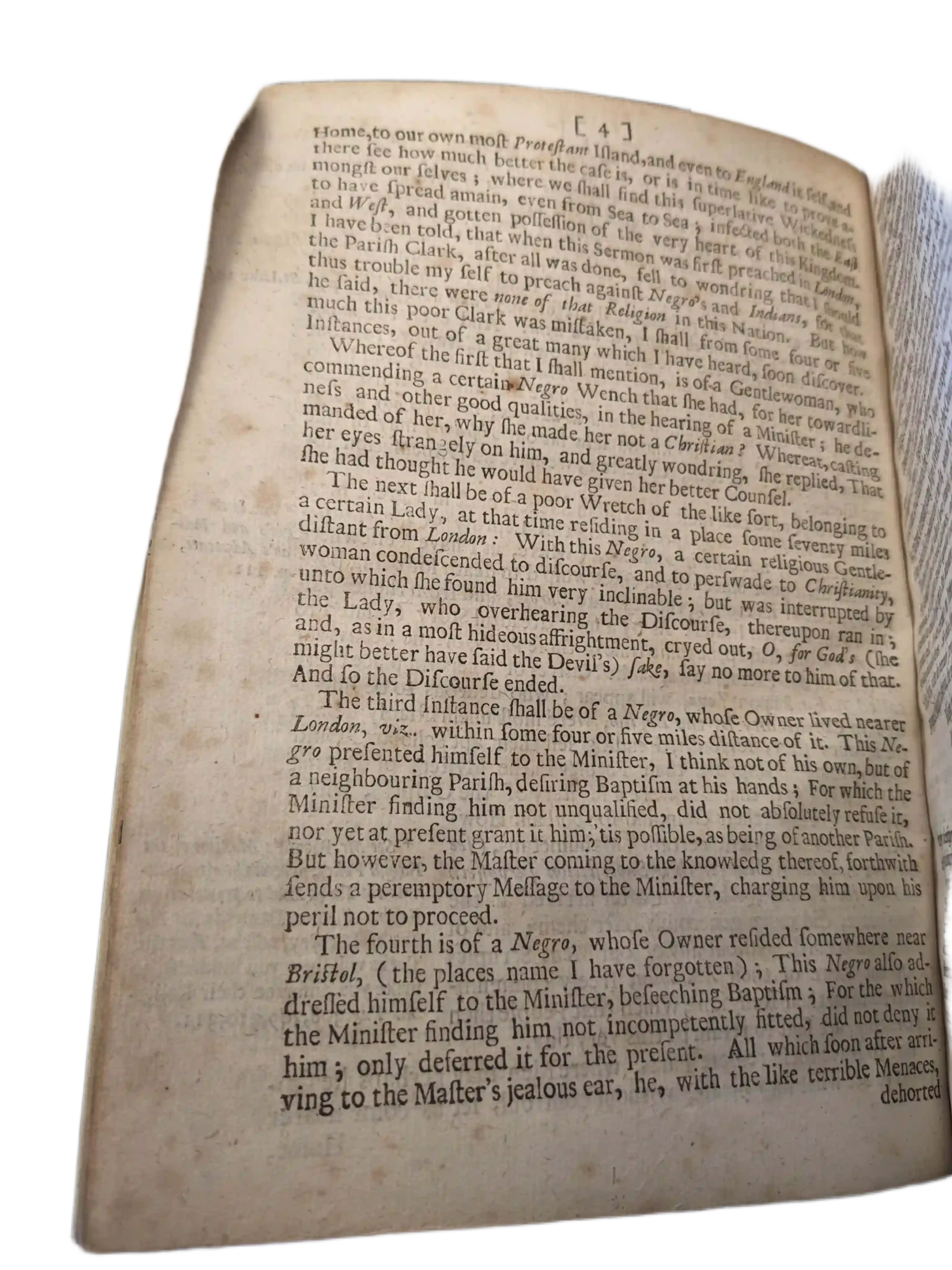
[4]
Home, to our own most Protestant Island, and even to England it self, and
there see how much better the case is, or is in time like to prove a-
mongst our selves; where we shall find this superlative Wickedness
to have spread amain, even from Sea to Sea; infected both the East
and West, and gotten possession of the very heart of this Kingdom.
I have been told, that when this Sermon was first preached in London,
the Parish Clark, after all was done, fell to wondring that I should
thus trouble my self to preach against Negro‘s and Indians, for that
he said, there were none of that Religion in this Nation. But how
much this poor Clark was mistaken, I shall from some four or five
Instances, out of a great many which I have heard, soon discover.
Whereof the first that I shall mention, is of a Gentlewoman, who
commending a certain Negro Wench that she had, for her towardli-
ness and other good qualities, in the hearing of a Minister; he de-
manded of her, why she made her not a Christian? Whereat, casting
her eyes strangely on him, and greatly wondring, she replied, That
she had thought he would have given her better Counsel.
The next shall be of a poor Wretch of the like sort, belonging to
a certain Lady, at that time residing in a place some seventy miles
distant from London: With this Negro, a certain religious Gentle-
woman condescended to discourse, and to perswade to Christianity,
unto which she found him very inclinable; but was interrupted by
the Lady, who overhearing the Discourse, thereupon ran in;
and, as in a most hideous affrightment, cryed out, O, for God`s (she
might better have said the Devil’s) sake, say no more to him of that.
And so the Discourse ended.
The third Instance shall be of a Negro, whose Owner lived nearer
London, viz. within some four or five miles distance of it. This Ne-
gro presented himself to the Minister, I think not of his own, but of
a neighbouring Parish, desiring Baptism at his hands; For which the
Minister finding him not unqualified, did not absolutely refuse it,
nor yet at present grant it him; ’tis possible, as being of another Parish.
But however, the Master coming to the knowledg thereof, forthwith
sends a peremptory Message to the Minister, charging him upon his
peril not to proceed.
The fourth is of a Negro, whose Owner resided somewhere near
Bristol, (the places name I have forgotten); This Negro also ad-
dressed himself to the Minister, beseeching Baptism; For the which
the Minister finding him not incompetently fitted, did not deny it
him; only deferred it for the present. All which soon after arri-
ving to the Master’s jealous ear, he, with the like terrible Menaces,
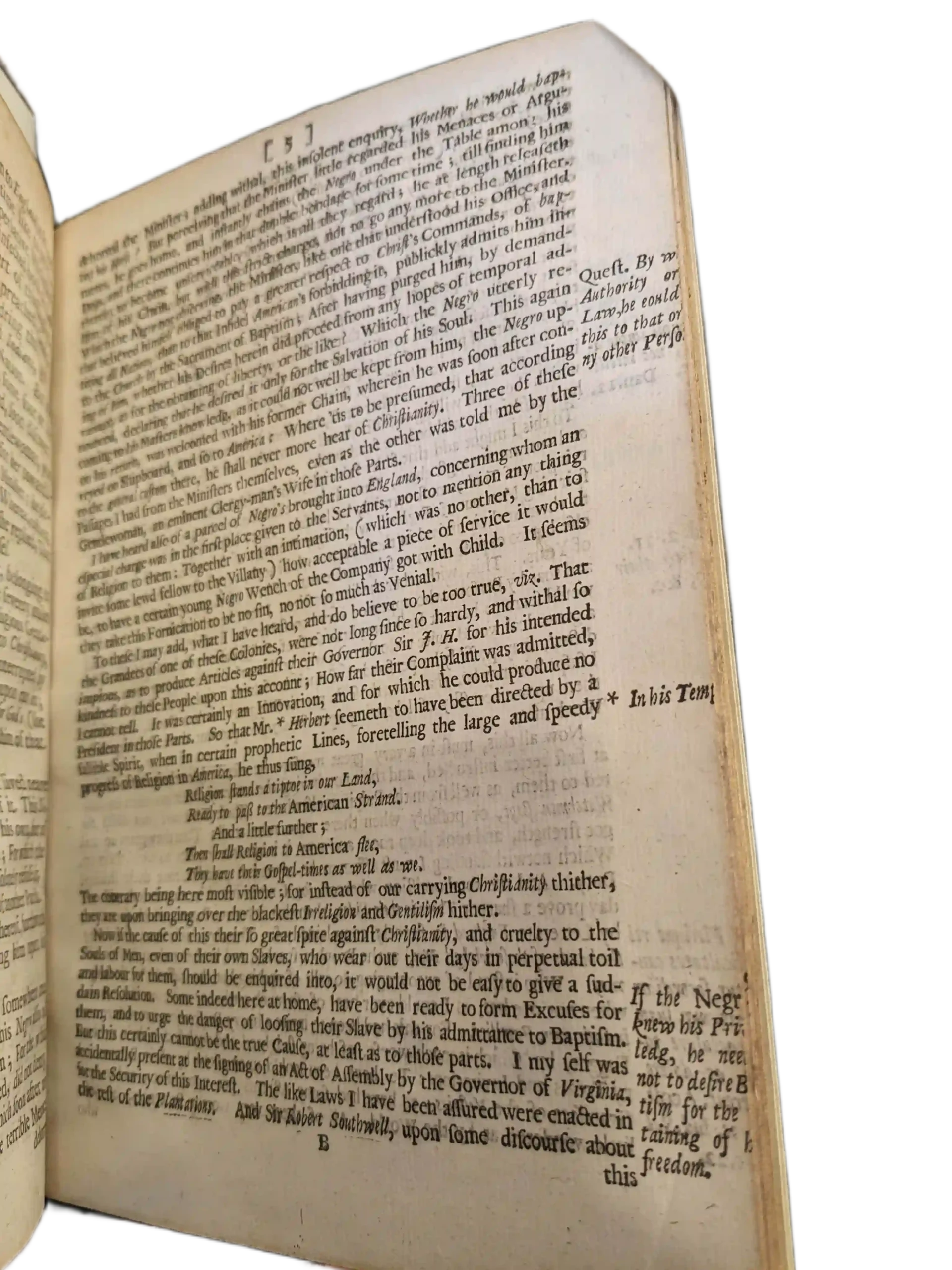
[5]
dehorted the Minister; adding withal, this insolent enquiry, Whether he would bap-
tize his Horse? But perceiving that the Minister little regarded his Menaces or Argu-
ments, he goes home, and instantly chains the Negro under the Table among his
Dogs, and there continues him in that double bondage for some time; till finding him
thereby to become unserviceable, which is all they regard; he at length releaseth
him of his Chain, but with this strict charge, not to go any more to the Minister.
Which the Negro not observing, the Minister, like one that understood his Office, and
that believed himself obliged to pay a greater respect to Christ‘s Commands, of bap-
tizing all Nations, than to that Infidel American‘s forbidding it, publickly admits him in-
to the Church by the Sacrament of Baptism; After having purged him, by demand-
ing of him, whether his Desires herein did proceed from any hopes of temporal ad-
vantage, 15Quest. By what Authority or Law, he could do this to that or any other Person? as for the obtaining of liberty, or the like? Which the Negro utterly re-
nounced, declaring that he desired it only for the Salvation of his Soul. This again
coming to his Masters knowledg, as it could not well be kept from him, the Negro up-
on his return, was welcomed with his former Chain, wherein he was soon after con-
veyed on Shipboard, and so to America: Where ’tis to be presumed, that according
to the general custom there, he shall never more hear of Christianity. Three of these
Passages I had from the Ministers themselves, even as the other was told me by the
Gentlewoman, an eminent Clergy-man’s Wife in those Parts.
I have heard also of a parcel of Negro`s brought into England, concerning whom an
especial charge was in the first place given to the Servants, not to mention any thing
of Religion to them: Together with an intimation, (which was no other, than to
invite some lewd fellow to the Villany) how acceptable a piece of service it would
be, to have a certain young Negro Wench of the Company got with Child. It seems
they take this Fornication to be no sin, no not so much as Venial.
To these I may add, what I have heard, and do believe to be too true, viz. That
the Grandees of one of these Colonies, were not long since so hardy, and withal so
impious, as to produce Articles against their Governor Sir J. H. for his intended
kindness to these People upon this account; How far their Complaint was admitted,
I cannot tell. It was certainly an Innovation, and for which he could produce no
President in those Parts. So that Mr. 16In his Temple. Herbert seemeth to have been directed by a
fallible Spirit, when in certain prophetic Lines, foretelling the large and speedy
progress of Religion in America, he thus sung,
Religion stands a tiptoe in our Land,
Ready to pass to the American Strand.
And a little further;
Then shall Religion to America flee,
They have their Gospel-times as well as we.
The contrary being here most visible; for instead of our carrying Christianity thither,
they are upon bringing over the blackest Irreligion and Gentilism hither.
Now if the cause of this their so great spite against Christianity, and cruelty to the
Souls of Men, even of their own Slaves, who wear out their days in perpetual toil
and labour for them, {If the Negro knew his Priviledg, he need not to desire Baptism for the obtaining of his freedom.} should be enquired into, it would not be easy to give a sud-
dain Resolution. Some indeed here at home, have been ready to form Excuses for
them, and to urge the danger of loosing their Slave by his admittance to Baptism.
But this certainly cannot be the true Cause, at least as to those parts. I my self was
accidentally present at the signing of an Act of Assembly by the Governor of Virginia,
for the Security of this Interest. The like Laws I have been assured were enacted in
the rest of the Plantations. And Sir Robert Southwell, upon some discourse about
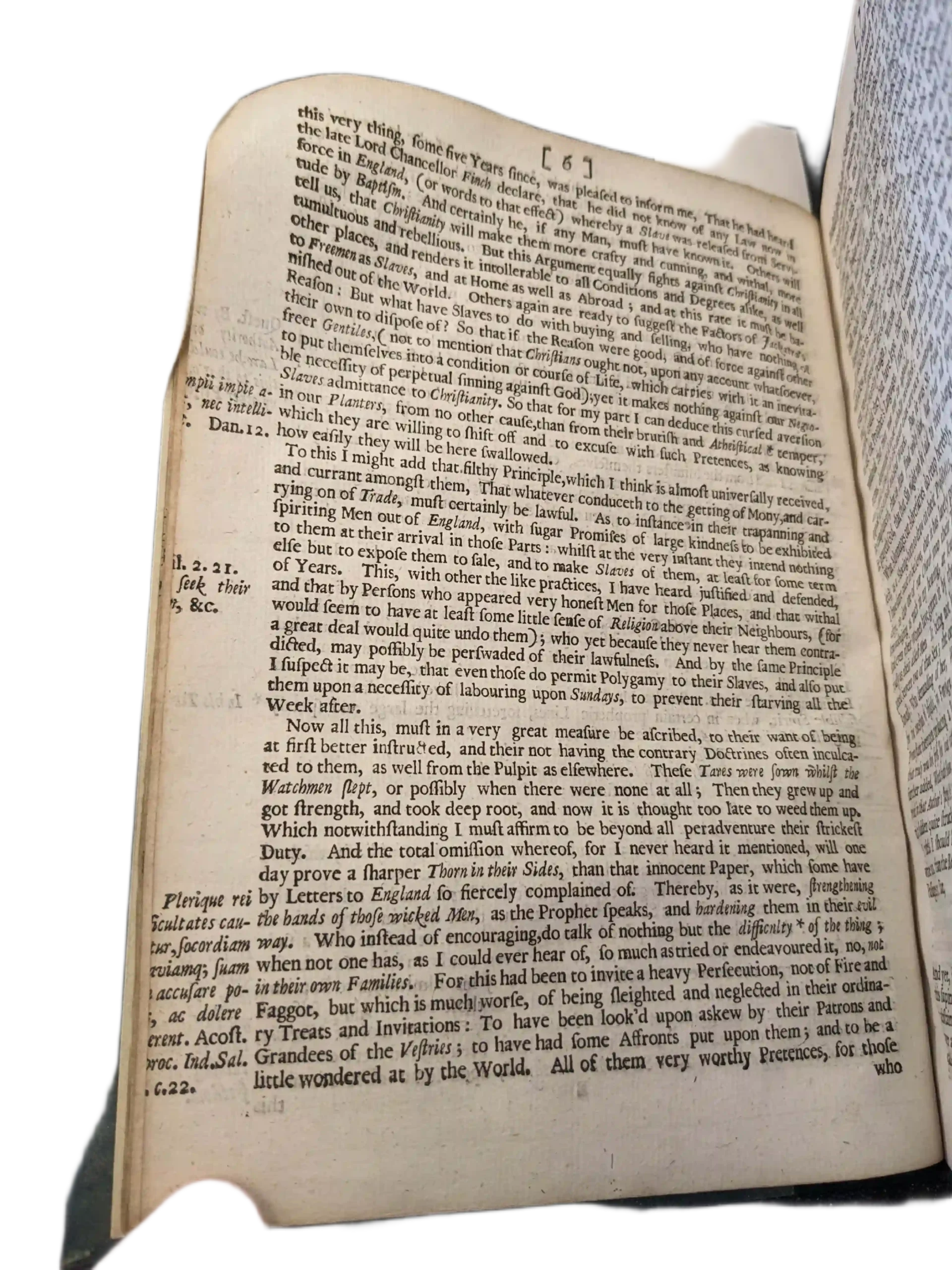
[6]
this very thing, some five Years since, was pleased to inform me, That he had heard
the late Lord Chancellor Finch declare, that he did not know of any Law now in
force in England, (or words to that effect) whereby a Slave was released from Servi-
tude by Baptism. And certainly he, if any Man, must have known it. Others will
tell us, that Christianity will make them more crafty and cunning, and withal, more
tumultuous and rebellious. But this Argument equally fights against Christianity in all
other places, and renders it intollerable to all Conditions and Degrees alike, as well
to Freemen as Slaves, and at Home as well as Abroad; and at this rate it must be ba-
nished out of the World. Others again are ready to suggest the Factors of Jackatra‘s
Reason: But what have Slaves to do with buying and selling, who have nothing of
their own to dispose of? So that if the Reason were good, and of force against other
freer Gentiles, (not to mention that Christians ought not, upon any account whatsoever,
to put themselves into a condition or course of Life, which carries with it an inevita-
ble necessity of perpetual sinning against God); yet it makes nothing against our Negro-
Slaves admittance to Christianity. So that for my part I can deduce this cursed aversion
in our Planters, from no other cause, than from their brutish and Atheistical 17Impii impie agent, nec intelligent. Dan. 12. temper,
which they are willing to shift off and to excuse with such Pretences, as knowing
how easily they will be here swallowed.
To this I might add that filthy Principle, which I think is almost universally received,
and currant amongst them, That whatever conduceth to the getting of Mony, and car-
rying on of Trade, must certainly be lawful. As to instance in their trapanning and
spiriting Men out of England, with sugar Promises of large kindness to be exhibited
to them at their arrival in those Parts: whilst at the very instant they intend nothing
else but to expose them to sale, and to make Slaves of them, at least for some term
of Years. 18Phil. 2. 21. All seek their own, &c. This, with other the like practices, I have heard justified and defended,
and that by Persons who appeared very honest Men for those Places, and that withal
would seem to have at least some little sense of Religion above their Neighbours, (for
a great deal would quite undo them); who yet because they never hear them contra-
dicted, may possibly be perswaded of their lawfulness. And by the same Principle
I suspect it may be, that even those do permit Polygamy to their Slaves, and also put
them upon a necessity of labouring upon Sundays, to prevent their starving all the
Week after.
Now all this, must in a very great measure be ascribed, to their want of being
at first better instructed, and their not having the contrary Doctrines often inculca-
ted to them, as well from the Pulpit as elsewhere. These Tares were sown whilst the
Watchmen slept, or possibly when there were none at all; Then they grew up and
got strength, and took deep root, and now it is thought too late to weed them up.
Which notwithstanding I must affirm to be beyond all peradventure their strickest
Duty. And the total omission whereof, for I never heard it mentioned, will one
day prove a sharper Thorn in their Sides, than that innocent Paper, which some have
by Letters to England so fiercely complained of. Thereby, as it were, strengthening
the hands of those wicked Men, as the Prophet speaks, and hardening them in their evil
way. Who instead of encouraging, do talk of nothing but the difficulty 19Plerique rei difficultates causantur, socordiam ignaviamq; suam cum accusare potius, ac dolere deberent. Acost. de proc. Ind. Sal. l. 3. c. 22. of the thing;
when not one has, as I could ever hear of, so much as tried or endeavoured it, no, not
in their own Families. For this had been to invite a heavy Persecution, not of Fire and
Faggot, but which is much worse, of being sleighted and neglected in their ordina-
ry Treats and Invitations: To have been look’d upon askew by their Patrons and
Grandees of the Vestries; to have had some Affronts put upon them; and to be a
little wondered at by the World. All of them very worthy Pretences, for those
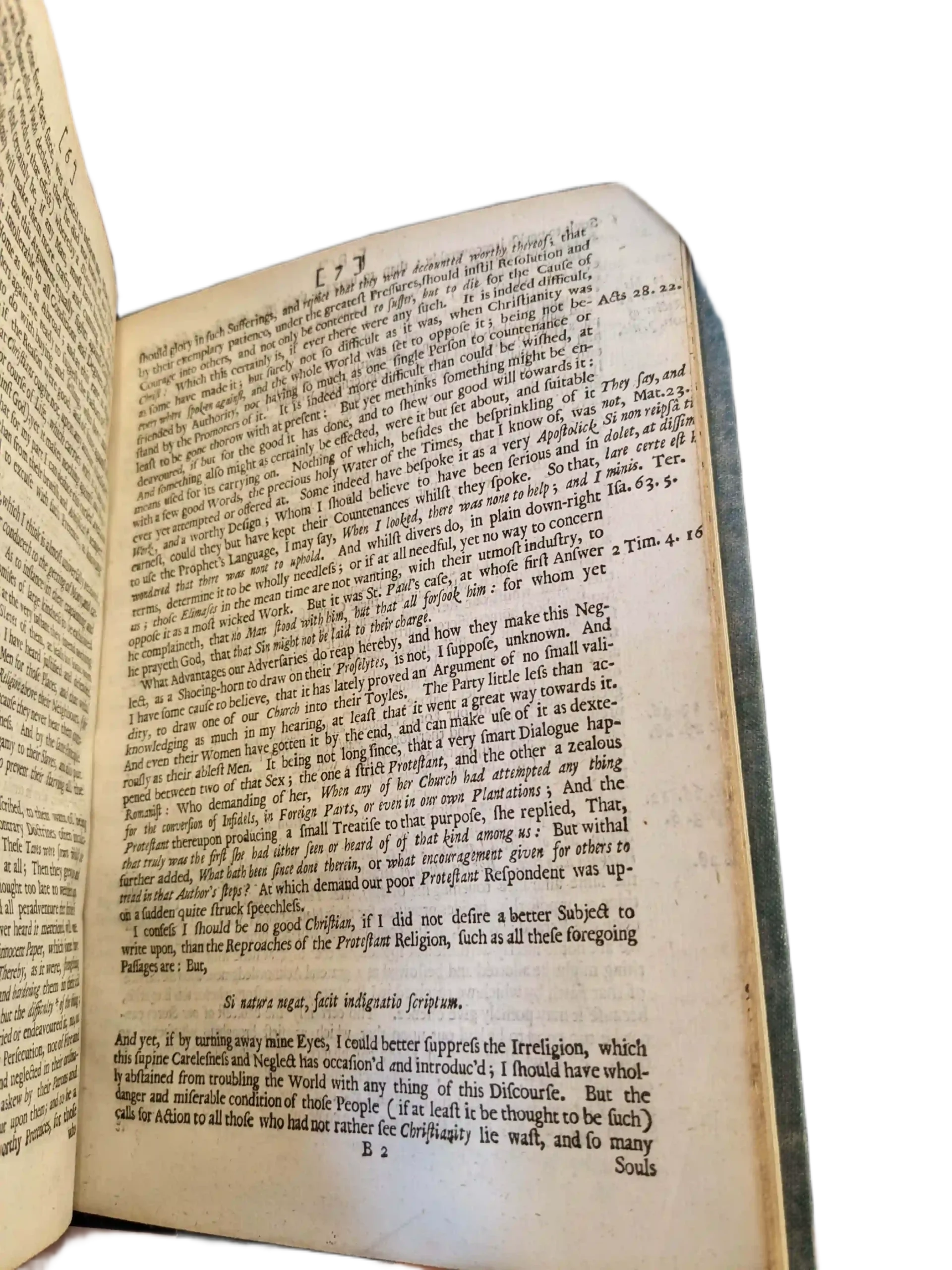
[7]
should glory in such Sufferings, and rejoice that they were accounted worthy thereof; that
by their exemplary patience, under the greatest Pressures, should instil Resolution and
Courage into others, and not only be contented to suffer, but to die for the Cause of
Christ: Which this certainly is, if ever there were any such. It is indeed difficult,
as some have made it; but surely not so difficult as it was, when Christianity was
every where spoken against, 20Acts 28.22. and the whole World was set to oppose it; being not be-
friended by Authority, nor having so much as one single Person to countenance or
stand by the Promoters of it. It is indeed more difficult than could be wished, at
least to be gone thorow with at present: But yet methinks something might be en-
deavoured, if but for the good it has done, and to shew our good will towards it:
And something also might as certainly be effected, were it but set about, and suitable
means used for its carrying on. 21They say, and do not, Mat. 23. 3. Si non reipsâ tibi dolet, at dissimulare certe est hominis. Ter. Isa. 63. 5. Nothing of which, besides the besprinkling of it
with a few good Words, the precious holy Water of the Times, that I know of, was
ever yet attempted or offered at. Some indeed have bespoke it as a very Apostolick
Work, and a worthy Design; Whom I should believe to have been serious and in
earnest, could they but have kept their Countenances whilst they spoke. So that,
to use the Prophet’s Language, I may say, When I looked, there was none to help; and I
wondered that there was none to uphold. And whilst divers do, in plain down-right
terms, determine it to be wholly needless; or if at all needful, yet no way to concern
us; those Elimases in the mean time are not wanting, with their utmost industry, to
oppose it as a most wicked Work. 222 Tim. 4. 16. But it was St. Paul‘s case, at whose first Answer
he complaineth, that no Man stood with him, but that all forsook him: for whom yet
he prayeth God, that that Sin might not be laid to their charge.
What Advantages our Adversaries do reap hereby, and how they make this Neg-
lect, as a Shoeing-horn to draw on their Proselytes, is not, I suppose, unknown. And
I have some cause to believe, that it has lately proved an Argument of no small vali-
dity, to draw one of our Church into their Toyles. The Party little less than ac-
knowledging as much in my hearing, at least that it went a great way towards it.
And even their Women have gotten it by the end, and can make use of it as dexte-
rously as their ablest Men. It being not long since, that a very smart Dialogue hap-
pened between two of that Sex; the one a strict Protestant, and the other a zealous
Romanist: Who demanding of her, When any of her Church had attempted any thing
for the conversion of Infidels, in Foreign Parts, or even in our own Plantations; And the
Protestant thereupon producing a small Treatise to that purpose, she replied, That,
that truly was the first she had either seen or heard of of that kind among us: But withal
further added, What hath been since done therein, or what encouragement given for others to
tread in that Author’s steps? At which demand our poor Protestant Respondent was up-
on a sudden quite struck speechless.
I confess I should be no good Christian, if I did not desire a better Subject to
write upon, than the Reproaches of the Protestant Religion, such as all these foregoing
Passages are: But,
Si natura negat, sacit indignatio scriptum.
And yet, if by turning away mine Eyes, I could better suppress the Irreligion, which
this supine Carelesness and Neglect has occasion’d and introduc’d; I should have whol-
ly abstained from troubling the World with any thing of this Discourse. But the
danger and miserable condition of those People (if at least it be thought to be such)
calls for Action to all those who had not rather see Christianity lie wast, and so many
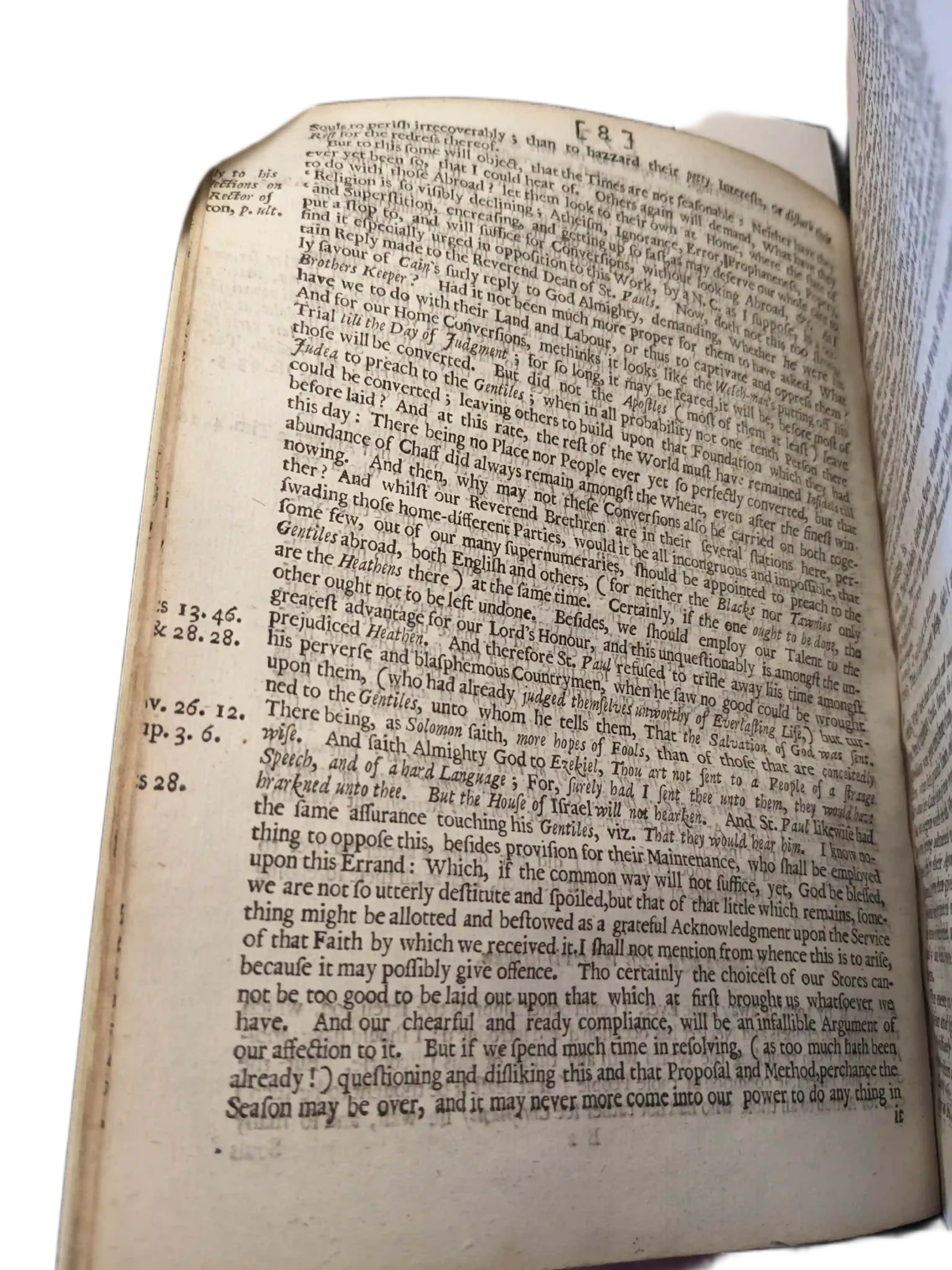
[8]
Souls to perish irrecoverably; than to hazzard their petty Interests, or disturb their
Rest for the redress thereof.
But to this some will object, that the Times are not seasonable: Neither have they
ever yet been so, that I could hear of. Others again will demand, What have they
to do with those Abroad? let them look to their own at Home, where the state of
‘ Religion is so visibly declining; 23Reply to his Reflections on the Rector of Sutton, p. ult. Atheism, Ignorance, Error, Prophaneness, Popery,
‘ and Superstition, encreasing, and getting up so fast, as may deserve our whole care to
put a stop to, and will suffice for Conversions, without looking Abroad, &c. As I
find it especially urged in opposition to this Work, by a N. C. as I suppose, in a cer-
tain Reply made to the Reverend Dean of St. Pauls. Now, doth not this too strong-
ly favour of Cain‘s surly reply to God Almighty, demanding, Whether he were his
Brothers Keeper? Had it not been much more proper for them to have asked, What
have we to do with their Land and Labour, or thus to captivate and oppress them?
And for our Home Conversions, methinks it looks like the Welch-man‘s putting off his
Trial till the Day of Judgment; for so long, it may be feared, it will be, before most of
those will be converted. But did not the Apostles (most of them at least) leave
Judea to preach to the Gentiles; when in all probability not one tenth Person there
could be converted; leaving others to build upon that. Foundation which they had
before laid? And at this rate, the rest of the World must have remained Infidels till
this day: There being no Place nor People ever yet so perfectly converted, but that
abundance of Chaff did always remain amongst the Wheat, even after the finest win-
nowing. And then, why may not these Conversions also be carried on both toge-
ther? And whilst our Reverend Brethren are in their several stations here, per-
swading those home-different Parties, would it be all incongruous and impossible, that
some few, out of our many supernumeraries, should be appointed to preach to the
Gentiles abroad, both English and others, (for neither the Blacks nor Tawnies only
are the Heathens there) at the same time. Certainly, if the one ought to be done, the
other ought not to be left undone. Besides, we should employ our Talent to the
greatest advantage for our Lord’s Honour, and this unquestionably is amongst the un-
prejudiced Heathen. 24Acts 13. 46. & 28. 28. And therefore St. Paul refused to trifle away his time amongst
his perverse and blasphemous Countrymen, when he saw no good could be wrought
upon them, (who had already judged themselves unworthy of Everlasting Life,) but tur-
ned to the Gentiles, unto whom he tells them, That the Salvation of God was sent.
There being, 25Prov. 26. 12. Chap. 3. 6. as Solomon saith, more hopes of Fools, than of those that are conceitedly
wise. And saith Almighty God to Ezekiel, Thou art not sent to a People of a strange
Speech, and of a hard Language; For, surely had I sent thee unto them, they would have
hrarkned unto thee. 26Acts 28. But the House of Israel will not hearken. And St. Paul likewise had
the same assurance touching his Gentiles, viz. That they would hear him. I know no-
thing to oppose this, besides provision for their Maintenance, who shall be employed
upon this Errand: Which, if the common way will not suffice, yet, God be blessed,
we are not so utterly destitute and spoiled, but that of that little which remains, some-
thing might be allotted and bestowed as a grateful Acknowledgment upon the Service
of that Faith by which we received it. I shall not mention from whence this is to arise,
because it may possibly give offence. Tho certainly the choicest of our Stores can-
not be too good to be laid out upon that which at first brought us whatsoever we
have. And our chearful and ready compliance, will be an infallible Argument of
our affection to it. But if we spend much time in resolving, (as too much hath been
already!) questioning and disliking this and that Proposal and Method, perchance the
Season may be over, and it may never more come into our power to do any thing in
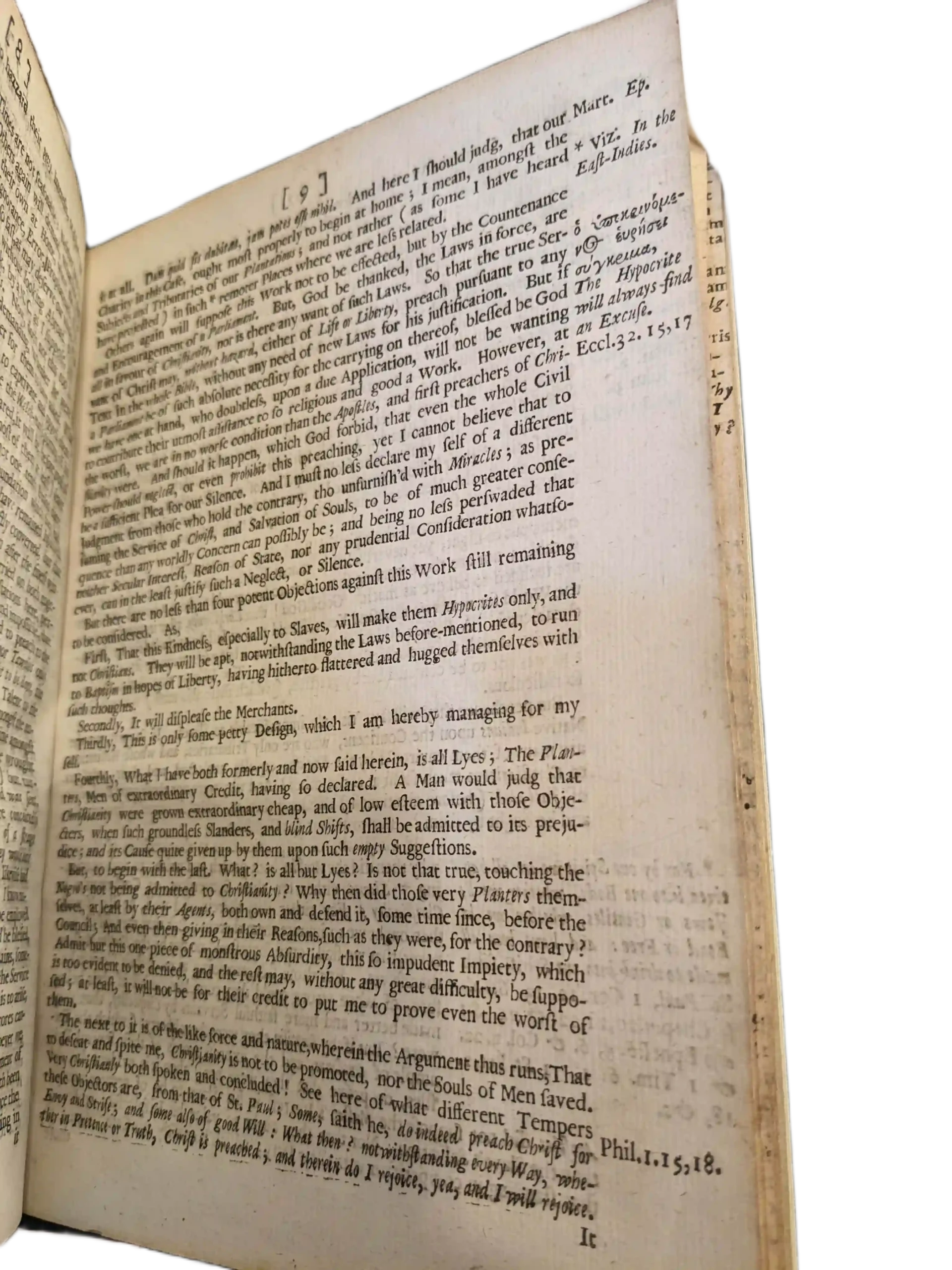
[9]
it at all. 27 Mart. Ep. Dum quid sis dubitat, iam potei esse nihil. And here I should judg, that our
Charity in this Case, ought most properly to begin at home; I mean, amongst the
Subjects and Tributaries of our Plantations; and not rather (as some I have heard
have projected) in such 28 Viz. In the East-Indies. remoter Places where we are less related.
Others again will suppose this Work not to be effected, but by the Countenance
and Encouragement of a Parliament. But, God be thanked, the Laws in force, are
all in favour of Christianity, 29[〈 in non-Latin alphabet 〉], The Hypocrite will always find an Excuse. nor is there any want of such Laws. So that the true Ser-
vant of Christ may, without hazard, either of Life or Liberty, preach pursuant to any
Text in the whole Bible, without any need of new Laws for his justification. But if
a Parliament be of such absolute necessity for the carrying on thereof, blessed be God
we have one at hand; who doubtless, upon a due Application, will not be wanting
to contribute their utmost assistance to so religious and good a Work. However, at
the worst, 30 Eccl. 32. 15, 17 we are in no worse condition than the Apostles, and first preachers of Chri-
stianity were. And should it happen, which God forbid, that even the whole Civil
Power should neglect, or even prohibit this preaching, yet I cannot believe that to
be a sufficient Plea for our Silence. And I must no less declare my self of a different
Judgment from those who hold the contrary, tho unfurnish’d with Miracles; as pre-
suming the Service of Christ, and Salvation of Souls, to be of much greater conse-
quence than any worldly Concern can possibly be; and being no less perswaded that
neither Secular Interest, Reason of State, nor any prudential Consideration whatso-
ever, can in the least justify such a Neglect, or Silence.
But there are no less than four potent Objections against this Work still remaining
to be considered. As,
First, That this kindness, especially to Slaves, will make them Hypocrites only, and
not Christians. They will be apt, notwithstanding the Laws before-mentioned, to run
to Baptism in hopes of Liberty, having hitherto flattered and hugged themselves with
such thoughts.
Secondly, It will displease the Merchants.
Thirdly, This is only some petty Design, which I am hereby managing for my
self.
Fourthly, What I have both formerly and now said herein, is all Lyes; The Plan-
ters, Men of extraordinary Credit, having so declared. A Man would judg that
Christianity were grown extraordinary cheap, and of low esteem with those Obje-
cters, when such groundless Slanders, and blind Shifts, shall be admitted to its preju-
dice; and its Cause quite given up by them upon such empty Suggestions.
But, to begin with the last. What? is all but Lyes? Is not that true, touching the
Negro`s not being admitted to Christianity? Why then did those very Planters them-
selves, at least by their Agents, both own and defend it, some time since, before the
Council; And even then giving in their Reasons, such as they were, for the contrary?
Admit but this one piece of monstrous Absurdity, this so impudent Impiety, which
is too evident to be denied, and the rest may, without any great difficulty, be suppo-
sed; at least, it will not be for their credit to put me to prove even the worst of
them.
The next to it is of the like force and nature, wherein the Argument thus runs, That
to defeat and spite me, Christianity is not to be promoted, nor the Souls of Men saved.
Very Christianly both spoken and concluded! See here of what different Tempers
these Objectors are, 31 Phil. 1. 15, 18. from that of St. Paul; Some, saith he, do indeed preach Christ for
Envy and Strife; and some also of good Will: What then? notwithstanding every Way, whe-
ther in Pretence or Truth, Christ is preached; and therein do I rejoice, yea, and I will rejoice.
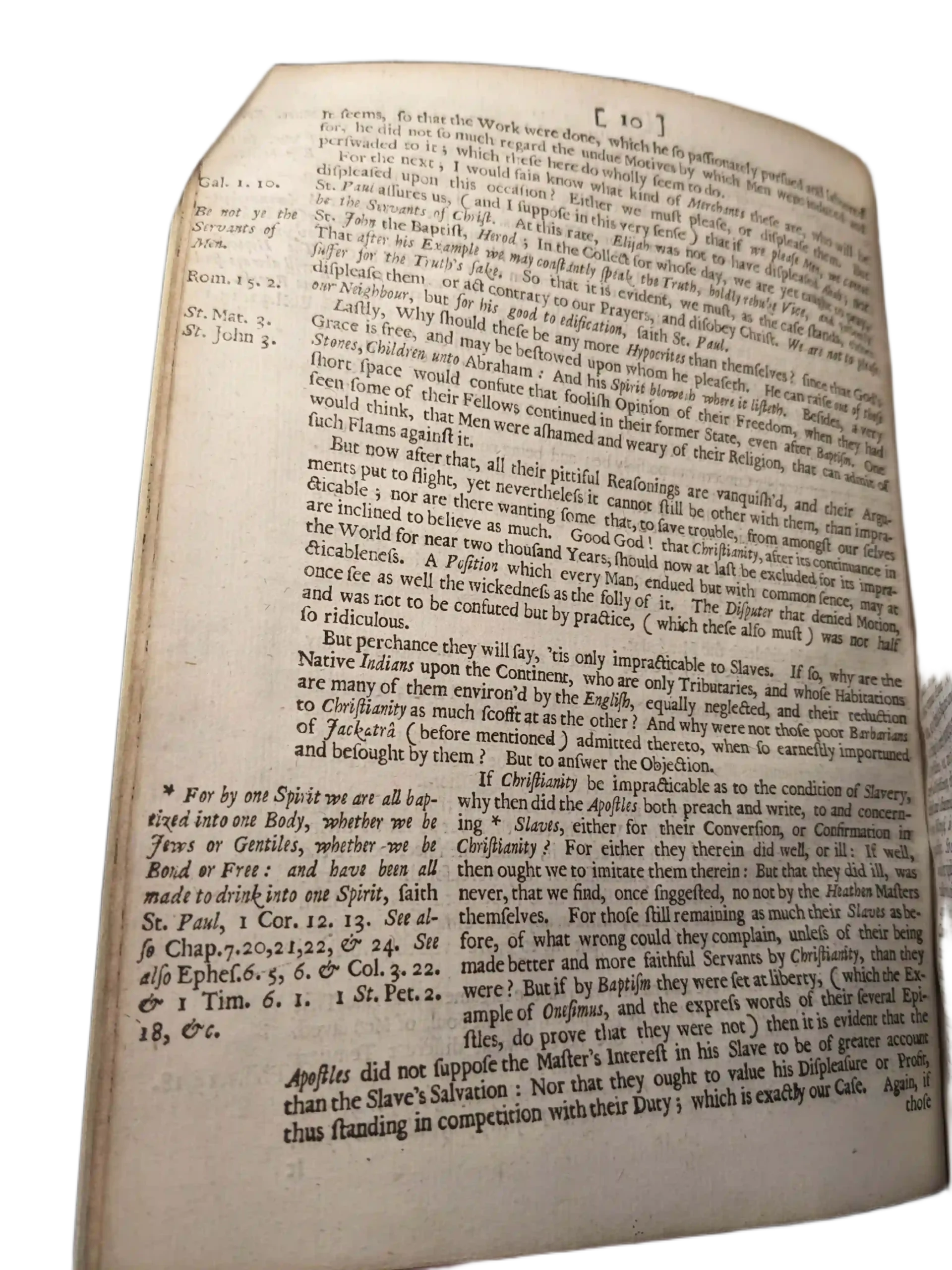
It seems, so that the Work were done, which he so passionately pursued and laboured
for, he did not so much regard the undue Motives by which Men were induced and
perswaded to it; which these here do wholly seem to do.
For the next; I would fain know what kind of Merchants these are, who will be
displeased upon this occasion? Either we must please, or displease them. But
St. Paul assures us, 32 Gal. 1. 10. (and I suppose in this very sense) that if we please Men, we cannot
be the Servants of Christ. At this rate, Elijah was not to have displeased Ahab; nor
St. John the Baptist, 33 Be not ye the Servants of Men. Herod; In the Collect for whose day, we are yet taught to pray,
That after his Example we may constantly speak the Truth, boldly rebuke Vice, and patiently
suffer for the Truth’s sake. So that it is evident, we must, as the case stands, either
displease them or act contrary to our Prayers, and disobey Christ. We are not to please
our Neighbour, 34 Rom. 15. 2. but for his good to edification, saith St. Paul.
Lastly, Why should these be any more Hypocrites than themselves? since that God’s
Grace is free, 35 St. Mat. 3. and may be bestowed upon whom he pleaseth. He can raise out of those
Stones, *St. John 3. Children unto Abraham: And his Spirit bloweth where it lifteth. Besides, a very
short space would confute that foolish Opinion of their Freedom, when they had
seen some of their Fellows continued in their former State, even after Baptism. One
would think, that Men were ashamed and weary of their Religion, that can admit of
such Flams against it.
But now after that, all their pittiful Reasonings are vanquish’d, and their Argu-
ments put to flight, yet nevertheless it cannot still be other with them, than impra-
cticable; nor are there wanting some that, to save trouble, from amongst our selves
are inclined to believe as much. Good God! that Christianity, after its continuance in
the World for near two thousand Years, should now at last be excluded for its impra-
cticableness. A Position which every Man, endued but with common sence, may at
once see as well the wickedness as the folly of it. The Disputer that denied Motion,
and was not to be confuted but by practice, (which these also must) was not half
so ridiculous.
But perchance they will say, ’tis only impracticable to Slaves. If so, why are the
Native Indians upon the Continent, who are only Tributaries, and whose Habitations
are many of them environ’d by the English, equally neglected, and their reduction
to Christianity as much scofft at as the other? And why were not those poor Barbarians
of Jackatrâ (before mentioned) admitted thereto, when so earnestly importuned
and besought by them? But to answer the Objection.
If Christianity be impracticable as to the condition of Slavery,
why then did the Apostles both preach and write, to and concern-
ing 36For by our Spirit we are all baptized into one Body, whether we be Jews or Gentiles, whether we be Bond or Free: and have been all made to drink into one Spirit, saith St. Paul, 1 Cor. 12. 13. See also Chap. 7. 20, 21, 22, & 24. See also Ephes. 6. 5, 6. & Col. 3. 22. & 1 Tim. 6. 1. 1 St. Pet. 2. 18, &c. Slaves, either for their Conversion, or Confirmation in
Christianity? For either they therein did well, or ill: If well,
then ought we to imitate them therein: But that they did ill, was
never, that we find, once suggested, no not by the Heathen Masters
themselves. For those still remaining as much their Slaves as be-
fore, of what wrong could they complain, unless of their being
made better and more faithful Servants by Christianity, than they
were? But if by Baptism they were set at liberty, (which the Ex-
ample of Onesimus, and the express words of their several Epi-
stles, do prove that they were not) then it is evident that the
Apostles did not suppose the Master’s Interest in his Slave to be of greater account
than the Slave’s Salvation: Nor that they ought to value his Displeasure or Profit,
thus standing in competition with their Duty; which is exactly our Case. Again, if
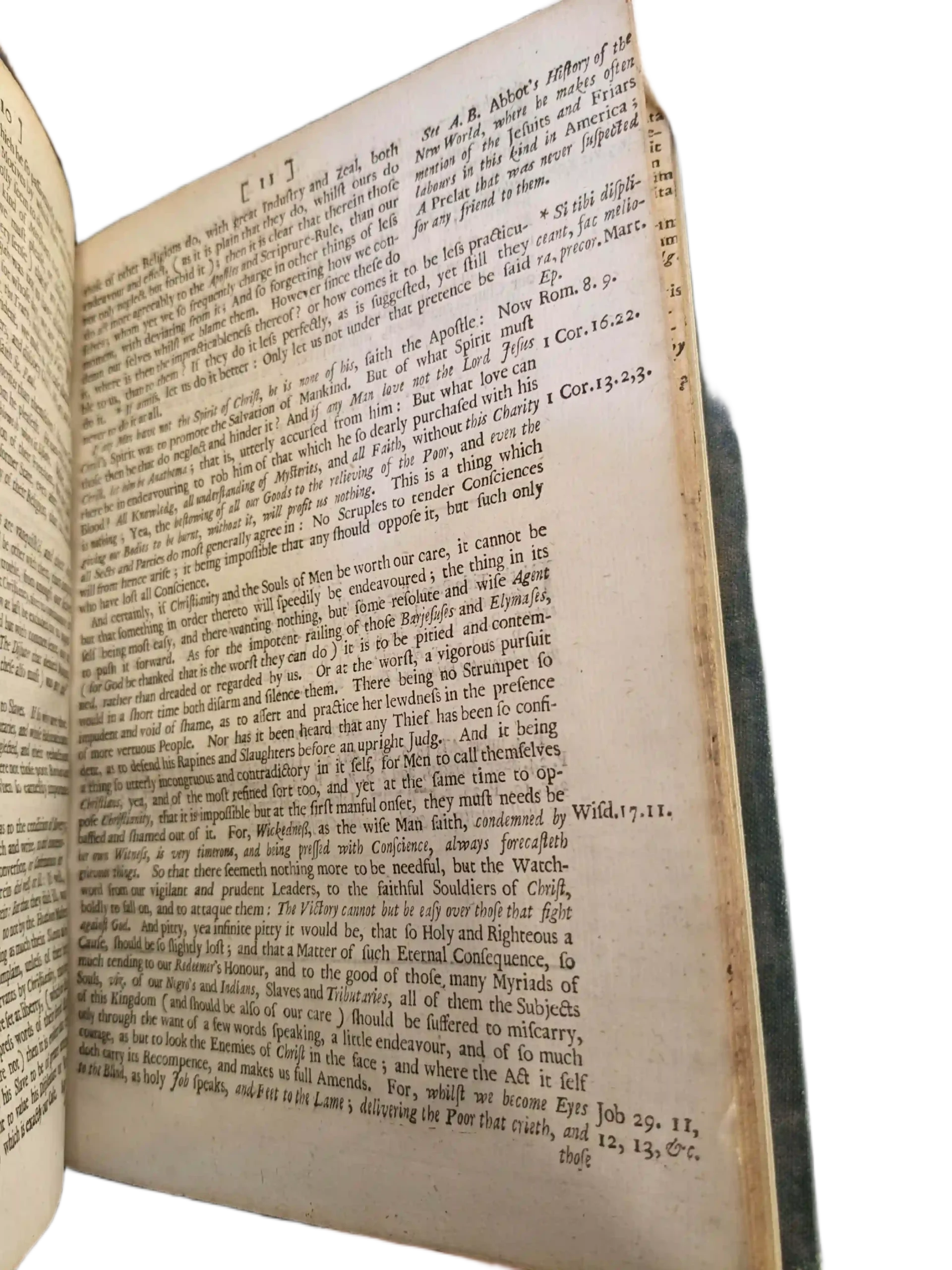
those of other Religions do, 37 See A. B. Abbot’s History of the New World, where he makes often mention of the Jesuits and Friars labours in this kind in America; A Prelat that was never suspected for any friend to them. with great Industry and Zeal, both
endeavour and effect, (as it is plain that they do, whilst ours do
not only neglect, but forbid it); then it is clear that therein those
do act more agreeably to the Apostles and Scripture-Rule, than our
selves; whom yet we so frequently charge in other things of less
moment, with deviating from it; And so forgetting how we con-
demn our selves whilst we blame them. However since these do
it, where is then the impracticableness thereof? or how comes it to be less practicu-
ble to us, than to them? If they do it less perfectly, as is suggested, yet still they
do it. 38 Si tibi displiceant, fac meliora, precor.Mart. Ep. If amiss, let us do it better: Only let us not under that pretence be said
never to do it at all.
If any Man have not the Spirit of Christ, 39 Rom. 8. 9. he is none of his, saith the Apostle: Now
Christ‘s Spirit was to promote the Salvation of Mankind. But of what Spirit must
those then be that do neglect and hinder it? 40 1 Cor. 16. 22. And if any Man love not the Lord Jesus
Christ, let him be Anathema; that is, utterly accursed from him: But what love can
there be in endeavouring to rob him of that which he so dearly purchased with his
Blood? 41 1 Cor. 13. 2, 3. All Knowledg, all understanding of Mysteries, and all Faith, without this Charity
is nothing; Yea, the bestowing of all our Goods to the relieving of the Poor, and even the
giving our Bodies to be burnt, without it, will profit us nothing. This is a thing which
all Sects and Parties do most generally agree in: No Scruples to tender Consciences
will from hence arise; it being impossible that any should oppose it, but such only
who have lost all Conscience.
And certainly, if Christianity and the Souls of Men be worth our care, it cannot be
but that something in order thereto will speedily be endeavoured; the thing in its
self being most easy, and there wanting nothing, but some resolute and wise Agent
to push it forward. As for the impotent railing of those Barjesuses and Elymases,
(for God be thanked that is the worst they can do) it is to be pitied and contem-
ned, rather than dreaded or regarded by us. Or at the worst, a vigorous pursuit
would in a short time both disarm and silence them. There being no Strumpet so
impudent and void of shame, as to assert and practice her lewdness in the presence
of more vertuous People. Nor has it been heard that any Thief has been so confi-
dent, as to defend his Rapines and Slaughters before an upright Judg. And it being
a thing so utterly incongruous and contradictory in it self, for Men to call themselves
Christians, yea, and of the most refined sort too, and yet at the same time to op-
pose Christianity, that it is impossible but at the first manful onset, they must needs be
baffled and shamed out of it. 42 Wisd. 17. 11. For, Wickedness, as the wise Man saith, condemned by
her own Witness, is very timerous, and being pressed with Conscience, always forecasteth
grievous things. So that there seemeth nothing more to be needful, but the Watch-
word from our vigilant and prudent Leaders, to the faithful Souldiers of Christ,
boldly to fall on, and to attaque them: The Victory cannot but be easy over those that fight
against God. And pitty, yea infinite pitty it would be, that so Holy and Righteous a
Cause, should be so slightly lost; and that a Matter of such Eternal Consequence, so
much tending to our Redeemer‘s Honour, and to the good of those many Myriads of
Souls, viz. of our Negro`s and Indians, Slaves and Tributaries, all of them the Subjects
of this Kingdom (and should be also of our care) should be suffered to miscarry,
only through the want of a few words speaking, a little endeavour, and of so much
courage, as but to look the Enemies of Christ in the face; and where the Act it self
doth carry its Recompence, 43 Job 29. 11, 12, 13, &c. and makes us full Amends. For, whilst we become Eyes
to the Blind, as holy Job speaks, and Feet to the Lame; delivering the Poor that crieth, and
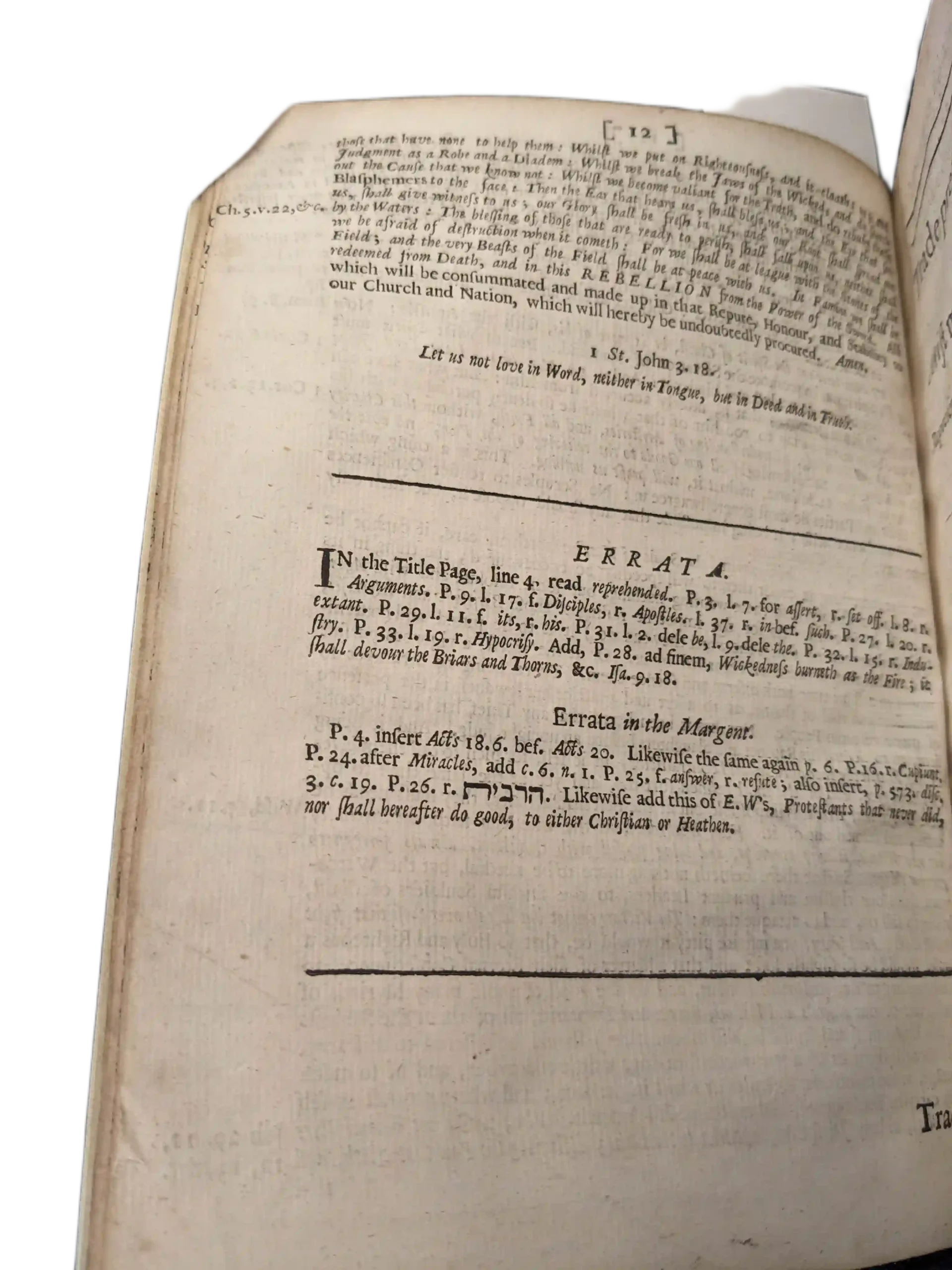
[12]
those that have none to help them: Whilst we put on Righteousness, and it cloaths us; and
Judgment as a Robe and a Diadem: Whilst we break the Jaws of the Wicked, and do search
out the Cause that we know not: Whilst we become valiant for the Truth, and do rebuke these
Blasphemers to the face: Then the Ear that hears us, shall bless us; and the Eye that sees
us, shall give witness to us; our Glory shall be fresh in us, and our Root shall spread out
by the Waters: 44 Ch. 5. v. 22, &c. The blessing of those that are ready to perish, shall fall upon us, neither shall
we be afraid of destruction when it cometh: For we shall be in league with the Stones of the
Field; and the very Beasts of the Field shall be at peace with us. In Famine we shall be
redeemed from Death, and in this REBELLION from the Power of the Sword. All
which will be consummated and made up in that Repute, Honour, and Stability to
our Church and Nation, which will hereby be undoubtedly procured. Amen.
1 St. John 3. 18.
Let us not love in Word, neither in Tongue, but in Deed and in Truth.
ERRATA.
IN the Title Page, line 4. read reprehended. P. 3. l. 7. for assert, r. set off. l. 8. r.
Arguments. P. 9. l. 17. f. Disciples, r. Apostles. l. 37. r. in bef. such. P. 27. l. 20. r.
extant. P. 29. l. 11. f. its, r. his. P. 31. l. 2. dele be, l. 9. dele the. P. 32. l. 15. r. Indu-
stry. P. 33. l. 19. r. Hypocrisy. Add, P. 28. ad finem, Wickedness burneth as the Fire; it
shall devour the Briars and Thorns, &c. Isa. 9. 18.
Errata in the Margent.
P. 4. insert Acts 18. 6. bef. Acts 20. Likewise the same again p. 6. P. 16. r. Cupiunt.
P. 24. after Miracles, add c. 6. n. 1. P. 25. f. answer, r. refute; also insert, p. 573. disc.
3. c. 19. P. 26. r. [〈 in non-Latin alphabet 〉]. Likewise add this of E. W‘s, Protestants that never did,
nor shall hereafter do good, to either Christian or Heathen.
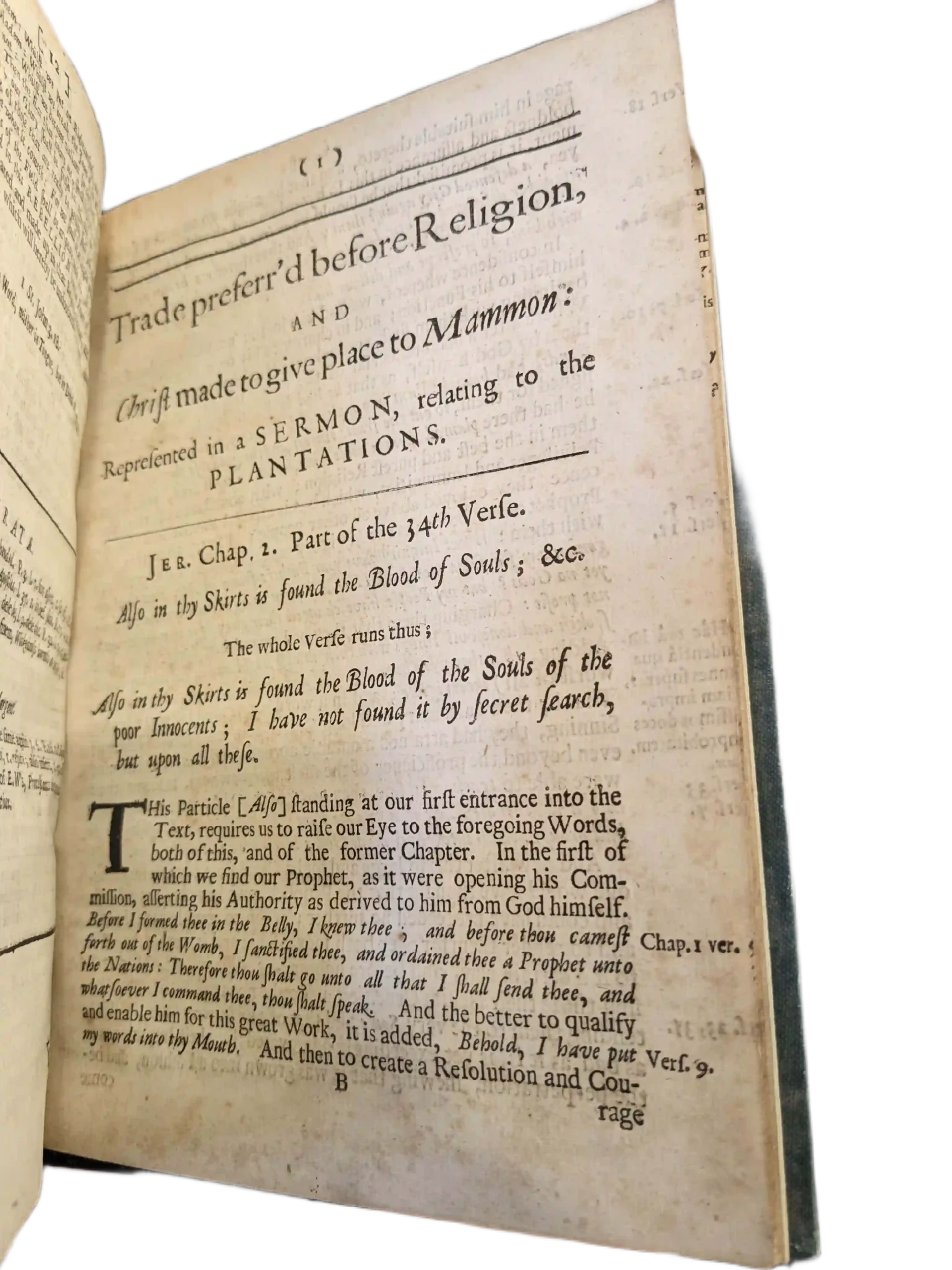
(1)
Trade preferr’d before Religion,
AND
Christ made to give place to Mammon:
Represented in a SERMON, relating to the
PLANTATIONS.
JER. Chap. 2. Part of the 34th Verse.
Also in thy Skirts is found the Blood of Souls; &c.
The whole Verse runs thus;
Also in thy Skirts is found the Blood of the Souls of the
poor Innocents; I have not found it by secret search,
but upon all these.
THis Particle [Also] standing at our first entrance into the
Text, requires us to raise our Eye to the foregoing Words,
both of this, and of the former Chapter. In the first of
which we find our Prophet, as it were opening his Com-
mission, asserting his Authority as derived to him from God himself.
Before I formed thee in the Belly, 45 Chap. 1 ver. 5, 7. I knew thee; and before thou camest
forth out of the Womb, I sanctified thee, and ordained thee a Prophet unto
the Nations: Therefore thou shalt go unto all that I shall send thee, and
whatsoever I command thee, thou shalt speak. And the better to qualify
and enable him for this great Work, 46 Vers. 9. it is added, Behold, I have put
my words into thy Mouth. And then to create a Resolution and Cou-
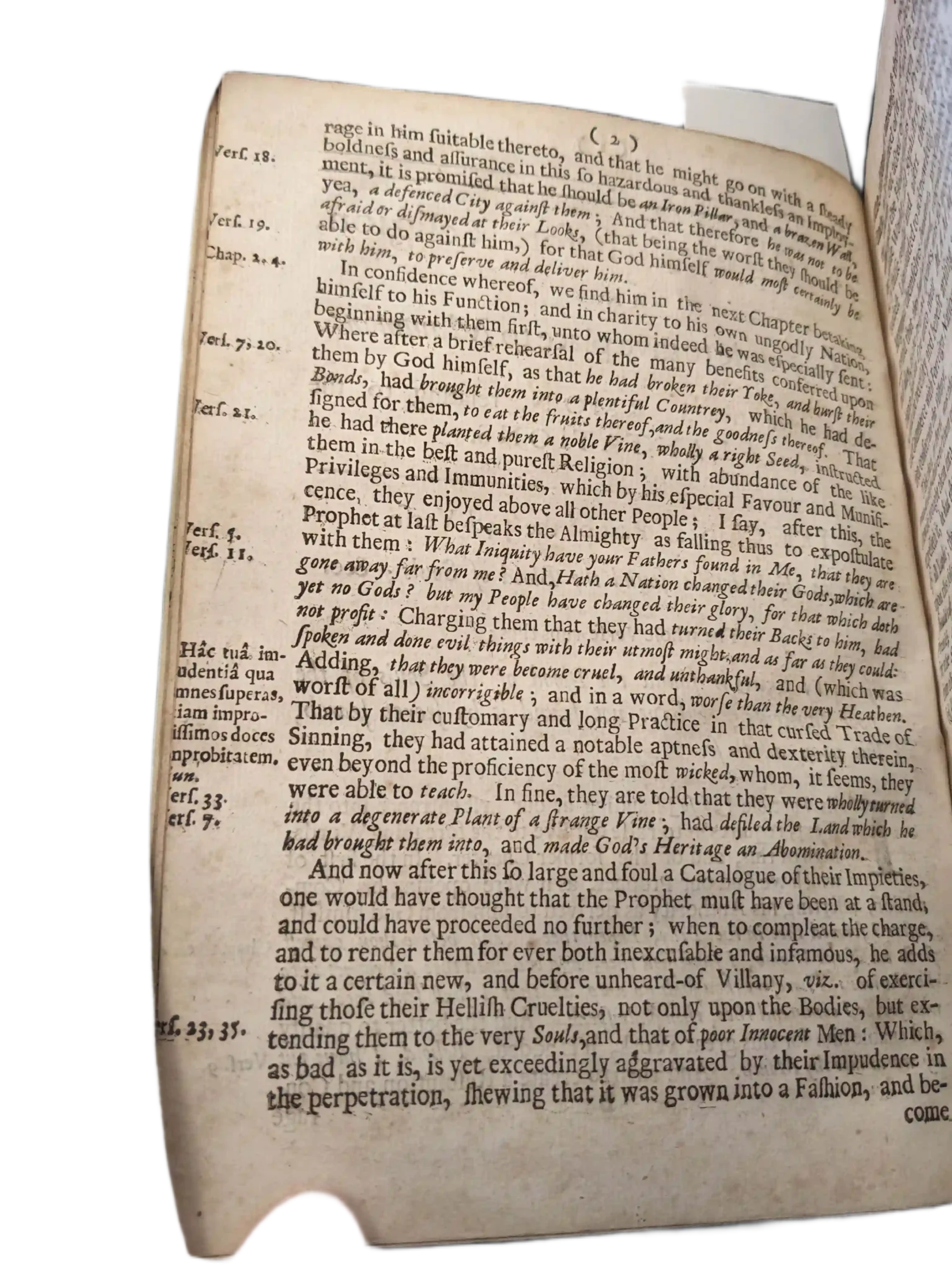
(2)
rage in him suitable thereto, and that he might go on with a steady
boldness and assurance in this so hazardous and thankless an Imploy-
ment, 47 Vers. 18. it is promised that he should be an Iron Pillar, and a brazen Wall,
yea, a defenced City against them; And that therefore he was not to be
afraid or dismayed at their Looks, (that being the worst they should be
able to do against him,) 48 Vers. 19. for that God himself would most certainly be
with him, to preserve and deliver him.
In confidence whereof, 49 Chap. 2. 4. we find him in the next Chapter betaking
himself to his Function; and in charity to his own ungodly Nation,
beginning with them first, unto whom indeed he was especially sent:
Where after a brief rehearsal of the many benefits conferred upon
them by God himself, 50 Vers. 7, 20. as that he had broken their Yoke, and burst their
Bonds, had brought them into a plentiful Countrey, which he had de-
signed for them, to eat the fruits thereof, and the goodness thereof. That
he had there planted them a noble Vine, 51Vers. 21. wholly a right Seed, instructed
them in the best and purest Religion; with abundance of the like
Privileges and Immunities, which by his especial Favour and Munifi-
cence, they enjoyed above all other People; I say, after this, the
Prophet at last bespeaks the Almighty as falling thus to expostulate
with them: 52 Vers 5. What Iniquity have your Fathers found in Me, that they are
gone away far from me? 53 Vers. 11. And, Hath a Nation changed their Gods, which are
yet no Gods? but my People have changed their glory, for that which doth
not profit: Charging them that they had turned their Backs to him, had
spoken and done evil things with their utmost might, and as far as they could:
Adding, 54 Hâc tuâ impudentiâ qua omnes superas, etiam improbissimos doces improbitatem. that they were become cruel, and unthankful, and (which was
worst of all) incorrigible; and in a word, worse than the very Heathen.
That by their customary and long Practice in that cursed Trade of
Sinning, they had attained a notable aptness and dexterity therein,
even beyond the proficiency of the most wicked, 55 Jun. whom, it seems, they
were able to teach. 56 Vers. 33. In fine, they are told that they were wholly turned
into a degenerate Plant of a strange Vine; 57 Vers. 7. had defiled the Land which he
had brought them into, and made God`s Heritage an Abomination.
And now after this so large and foul a Catalogue of their Impieties,
one would have thought that the Prophet must have been at a stand,
and could have proceeded no further; when to compleat the charge,
and to render them for ever both inexcusable and infamous, he adds
to it a certain new, and before unheard-of Villany, viz. of exerci-
sing those their Hellish Cruelties, 58 Vers. 23, 35. not only upon the Bodies, but ex-
tending them to the very Souls, and that of poor Innocent Men: Which,
as bad as it is, is yet exceedingly aggravated by their Impudence in
the perpetration, shewing that it was grown into a Fashion, and be-
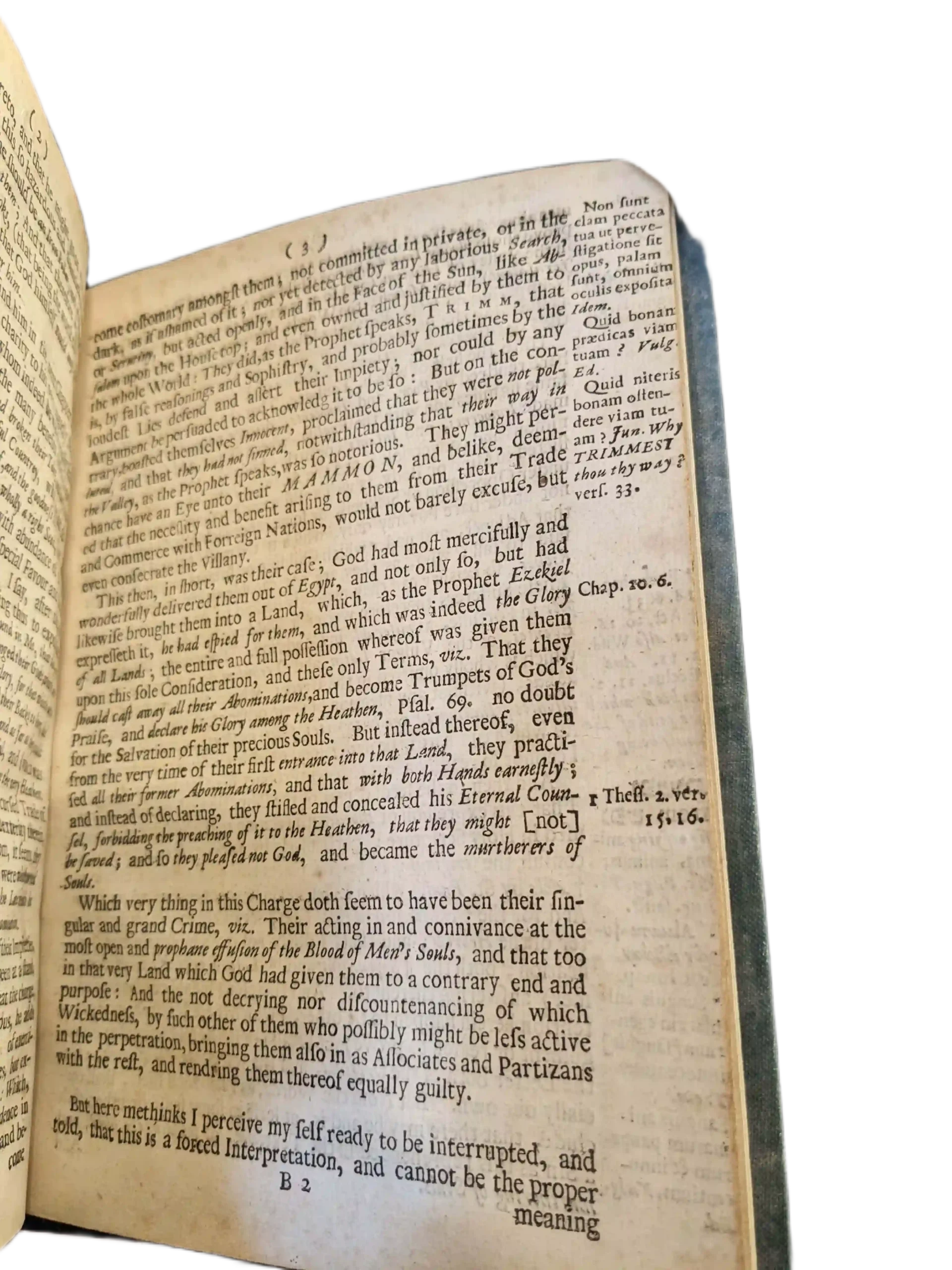
(3)
come costomary amongst them; 59 Non sun̄t clām peccata tua ut pervestigatione sit opus, palam sunt, omnium oculis exposita. Idem. not committed in private, or in the
dark, as if ashamed of it; nor yet detected by any laborious Search,
or Scrutiny, but acted openly, and in the Face of the Sun, like Ab-
salom upon the House top; and even owned and justified by them to
the whole World: They did, as the Prophet speaks, TRIMM, that
is, by false reasonings and Sophistry, and probably sometimes by the
loudest Lies defend and assert their Impiety; 60 Quid bonam praedicas viam tuam? Vulg. Ed. nor could by any
Argument be persuaded to acknowledg it to be so: But on the con-
trary, boasted themselves Innocent, proclaimed that they were not pol-
luted, 61 Quid niteris bonam ostendere viam tuam? Jun. Why TRIMMEST thou thy way? vers. 33. and that they had not sinned, notwithstanding that their way in
the Valley, as the Prophet speaks, was so notorious. They might per-
chance have an Eye unto their MAMMON, and belike, deem-
ed that the necessity and benefit arising to them from their Trade
and Commerce with Forreign Nations, would not barely excuse, but
even consecrate the Villany.
This then, in short, was their case; God had most mercifully and
wonderfully delivered them out of Egypt, and not only so, but had
likewise brought them into a Land, which, as the Prophet Ezekiel
expresseth it, 62 Chap. 10. 6. he had espied for them, and which was indeed the Glory
of all Lands; the entire and full possession whereof was given them
upon this sole Consideration, and these only Terms, viz. That they
should cast away all their Abominations, and become Trumpets of God’s
Praise, and declare his Glory among the Heathen, Psal. 69. no doubt
for the Salvation of their precious Souls. But instead thereof, even
from the very time of their first entrance into that Land, they practi-
sed all their former Abominations, and that with both Hands earnestly;
and instead of declaring, 63 1 Thess. 2. ver. 15. 16. they stifled and concealed his Eternal Coun-
sel, forbidding the preaching of it to the Heathen, that they might [not]
be saved; and so they pleased not God, and became the murtherers of
Souls.
Which very thing in this Charge doth seem to have been their sin-
gular and grand Crime, viz. Their acting in and connivance at the
most open and prophane effusion of the Blood of Men`s Souls, and that too
in that very Land which God had given them to a contrary end and
purpose: And the not decrying nor discountenancing of which
Wickedness, by such other of them who possibly might be less active
in the perpetration, bringing them also in as Associates and Partizans
with the rest, and rendring them thereof equally guilty.
But here methinks I perceive my self ready to be interrupted, and
told, that this is a forced Interpretation, and cannot be the proper
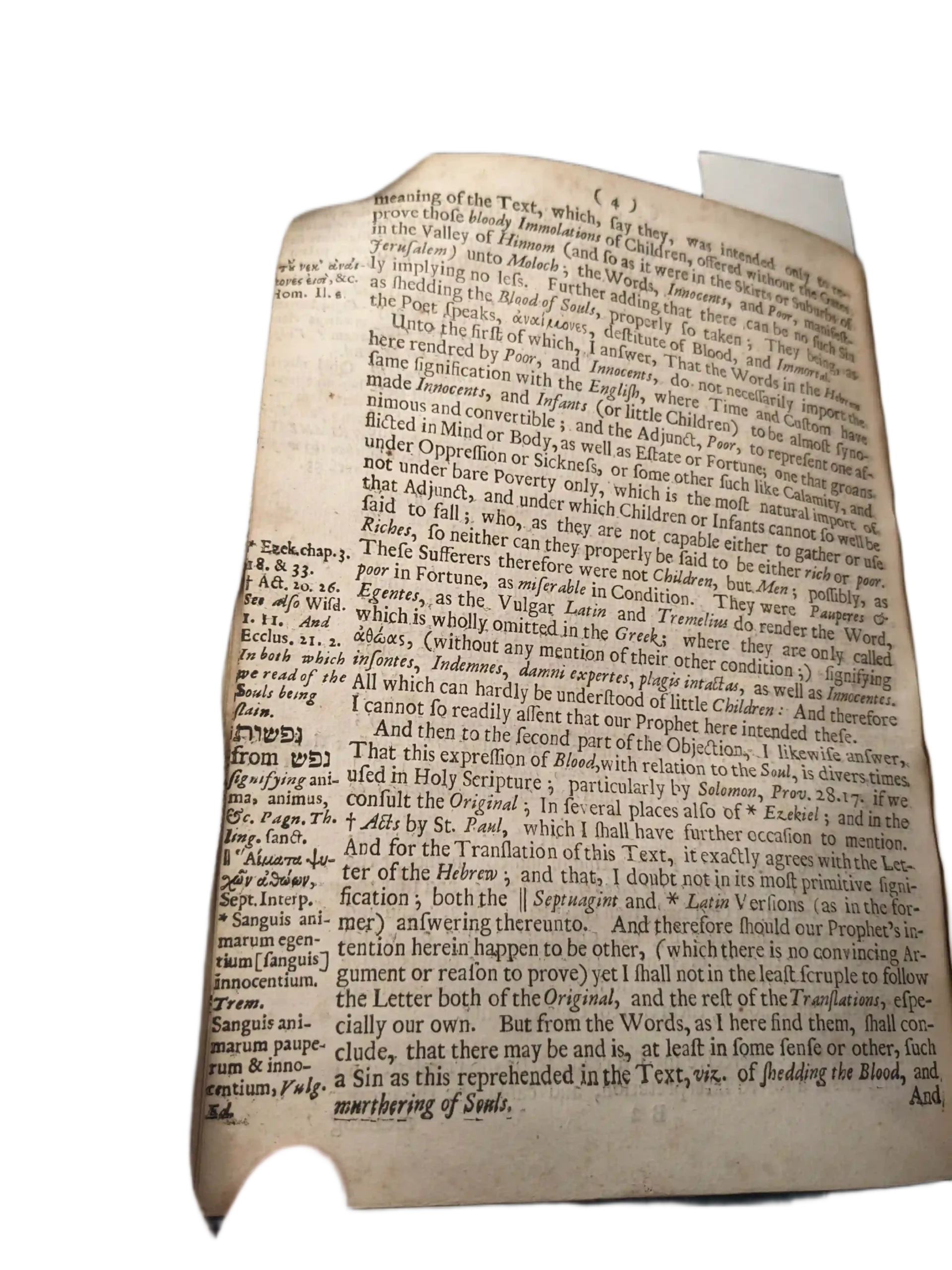
(4)
meaning of the Text, which, say they, was intended only to re-
prove those bloody Immolations of Children, offered without the Gates
in the Valley of Hinnom (and so as it were in the Skirts or Suburbs of
Jerusalem) unto Moloch; the Words, Innocents, and Poor, manifest-
ly implying no less. 64 [〈 in non-Latin alphabet 〉] &c. Hom. Il. [?]. Further adding that there can be no such Sin
as shedding the Blood of Souls, properly so taken; They being, as
the Poet speaks, [〈 in non-Latin alphabet 〉], destitute of Blood, and Immortal.
Unto the first of which, I answer, That the Words in the Hebrew
here rendred by Poor, and Innocents, do not necessarily import the
same signification with the English, where Time and Custom have
made Innocents, and Infants (or little Children) to be almost syno-
nimous and convertible; and the Adjunct, Poor, to represent one af-
flicted in Mind or Body, as well as Estate or Fortune; one that groans
under Oppression or Sickness, or some other such like Calamity, and
not under bare Poverty only, which is the most natural import of
that Adjunct, and under which Children or Infants cannot so well be
said to fall; who, as they are not capable either to gather or use
Riches, so neither can they properly be said to be either rich or poor.
These Sufferers therefore were not Children, but Men; possibly, as
poor in Fortune, as miserable in Condition. They were Pauperes &
Egentes, as the Vulgar Latin and Tremelius do render the Word,
which is wholly omitted in the Greek; where they are only called
[〈 in non-Latin alphabet 〉], (without any mention of their other condition;) signifying
insontes, Indemnes, damni expertes, plagis intactas, as well as Innocentes.
All which can hardly be understood of little Children: And therefore
I cannot so readily assent that our Prophet here intended these.
And then to the second part of the Objection, I likewise answer,
That this expression of Blood, with relation to the Soul, is divers times
used in Holy Scripture; particularly by Solomon, Prov. 28. 17. if we
consult the Original; In several places also of 65 Ezek. chap. 3. 18. & 33. Ezekiel; and in the
†Act. 20. 26. See also Wisd. 1. 11. And Ecclus. 21. 2. In both which we read of the Souls being slain. [〈 in non-Latin alphabet 〉] from [〈 in non-Latin alphabet 〉] signifying anima, animus, &c. Pagn. Th. ling. sanct. Acts by St. Paul, which I shall have further occasion to mention.
And for the Translation of this Text, it exactly agrees with the Let-
ter of the Hebrew; and that, I doubt not in its most primitive signi-
fication; both the ‖[〈 in non-Latin alphabet 〉], Sept. Interp. Septuagint and 66 Sanguis animarum egentium [sanguis] innocentium. Trem. Sanguis animarum pauperum & innocentium, Vulg. Ed. Latin Versions (as in the for-
mer) answering thereunto. And therefore should our Prophet’s in-
tention herein happen to be other, (which there is no convincing Ar-
gument or reason to prove) yet I shall not in the least scruple to follow
the Letter both of the Original, and the rest of the Translations, espe-
cially our own. But from the Words, as I here find them, shall con-
clude, that there may be and is, at least in some sense or other, such
a Sin as this reprehended in the Text, viz. of shedding the Blood, and
murthering of Souls.
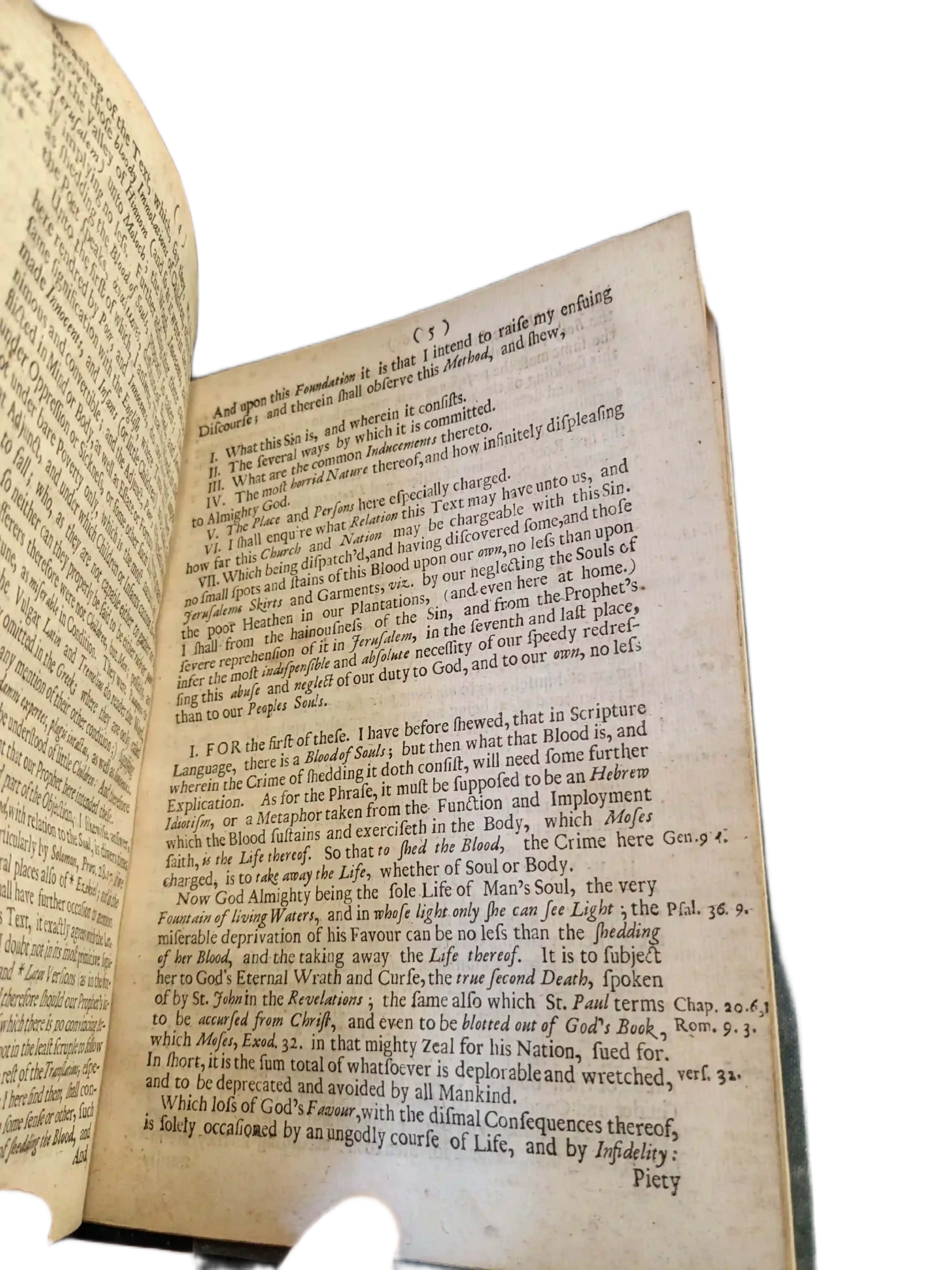
(5)
And upon this Foundation it is that I intend to raise my ensuing
Discourse; and therein shall observe this Method, and shew,
I. What this Sin is, and wherein it consists.
II. The several ways by which it is committed.
III. What are the common Inducements thereto.
IV. The most horrid Nature thereof, and how infinitely displeasing
to Almighty God.
V. The Place and Persons here especially charged.
VI. I shall enquire what Relation this Text may have unto us, and
how far this Church and Nation may be chargeable with this Sin.
VII. Which being dispatch’d, and having discovered some, and those
no small spots and stains of this Blood upon our own, no less than upon
Jerusalems Skirts and Garments, viz. by our neglecting the Souls of
the poor Heathen in our Plantations, (and even here at home.)
I shall from the hainousness of the Sin, and from the Prophet’s
severe reprehension of it in Jerusalem, in the seventh and last place,
infer the most indispensible and absolute necessity of our speedy redres-
sing this abuse and neglect of our duty to God, and to our own, no less
than to our Peoples Souls.
I. FOR the first of these. I have before shewed, that in Scripture
Language, there is a Blood of Souls; but then what that Blood is, and
wherein the Crime of shedding it doth consist, will need some further
Explication. As for the Phrase, it must be supposed to be an Hebrew
Idiotism, or a Metaphor taken from the Function and Imployment
which the Blood sustains and exerciseth in the Body, which Moses
saith, 67 Gen. 9 4. is the Life thereof. So that to shed the Blood, the Crime here
charged, is to take away the Life, whether of Soul or Body.
Now God Almighty being the sole Life of Man’s Soul, the very
Fountain of living Waters, 68 Psal. 36. 9. and in whose light only she can see Light; the
miserable deprivation of his Favour can be no less than the shedding
of her Blood, and the taking away the Life thereof. It is to subject
her to God’s Eternal Wrath and Curse, the true second Death, spoken
of by St. John in the Revelations 69 Chap. 20. 6, 14. ; the same also which St. Paul terms
to be accursed from Christ, 70 Rom. 9. 3. and even to be blotted out of God`s Book,
which Moses, Exod. 32. in that mighty Zeal for his Nation, sued for.
In short, 71 vers. 32. it is the sum total of whatsoever is deplorable and wretched,
and to be deprecated and avoided by all Mankind.
Which loss of God’s Favour, with the dismal Consequences thereof,
is solely occasioned by an ungodly course of Life, and by Infidelity:
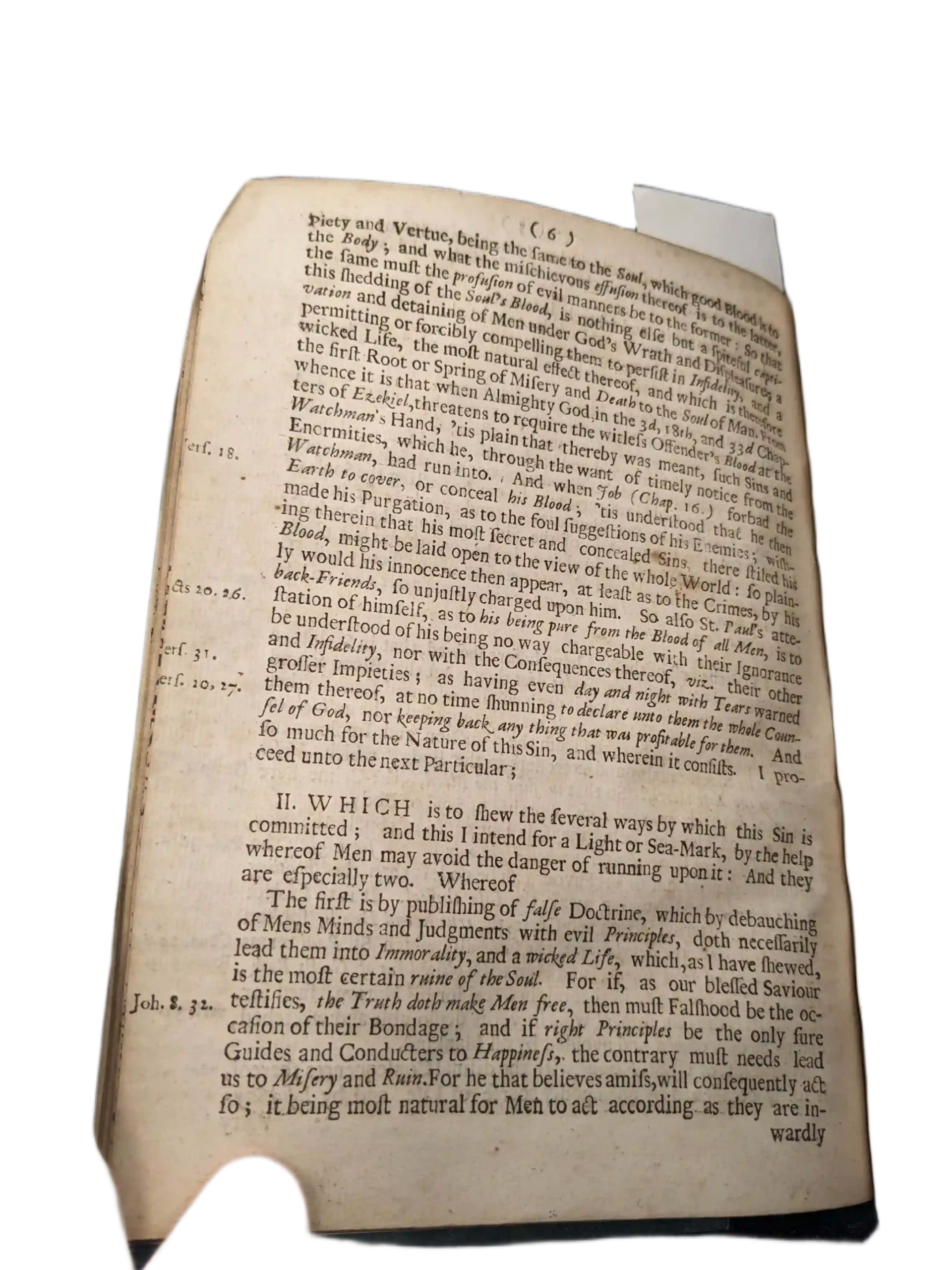
(6)
Piety and Vertue, being the same to the Soul, which good Blood is to
the Body; and what the mischievous effusion thereof is to the latter,
the same must the profusion of evil manners be to the former: So that
this shedding of the Soul’s Blood, is nothing else but a spiteful capti-
vation and detaining of Men under God’s Wrath and Displeasure; a
permitting or forcibly compelling them to persist in Infidelity, and a
wicked Life, the most natural effect thereof, and which is therefore
the first Root or Spring of Misery and Death to the Soul of Man. From
whence it is that when Almighty God in the 3d, 18th, and 33d Chap-
ters of Ezekiel, threatens to require the witless Offender’s Blood at the
Watchman’s Hand, ’tis plain that thereby was meant, such Sins and
Enormities, which he, through the want of timely notice from the
Watchman, had run into. And when Job (Chap. 16.) forbad the
Earth to cover, 72Vers. 18. or conceal his Blood; ’tis understood that he then
made his Purgation, as to the foul suggestions of his Enemies; wish-
ing therein that his most secret and concealed Sins, there stiled his
Blood, might be laid open to the view of the whole World: so plain-
ly would his innocence then appear, at least as to the Crimes, by his
back-Friends, so unjustly charged upon him. So also St. Paul’s atte-
station of himself, 73Acts 20. 26. as to his being pure from the Blood of all Men, is to
be understood of his being no way chargeable with their Ignorance
and Infidelity, nor with the Consequences thereof, viz. their other
grosser Impieties; 74Vers 31. as having even day and night with Tears warned
them thereof, 75Vers. 20, 27. at no time shunning to declare unto them the whole Coun-
sel of God, nor keeping back any thing that was profitable for them. And
so much for the Nature of this Sin, and wherein it consists. I pro-
ceed unto the next Particular;
II. WHICH is to shew the several ways by which this Sin is
committed; and this I intend for a Light or Sea-Mark, by the help
whereof Men may avoid the danger of running upon it: And they
are especially two. Whereof
The first is by publishing of false Doctrine, which by debauching
of Mens Minds and Judgments with evil Principles, doth necessarily
lead them into Immorality, and a wicked Life, which, as I have shewed,
is the most certain ruine of the Soul. For if, as our blessed Saviour
testifies, 76St. Joh. 8. 32 the Truth doth make Men free, then must Falshood be the oc-
casion of their Bondage; and if right Principles be the only sure
Guides and Conducters to Happiness, the contrary must needs lead
us to Misery and Ruin. For he that believes amiss, will consequently act
so; it being most natural for Men to act according as they are in—
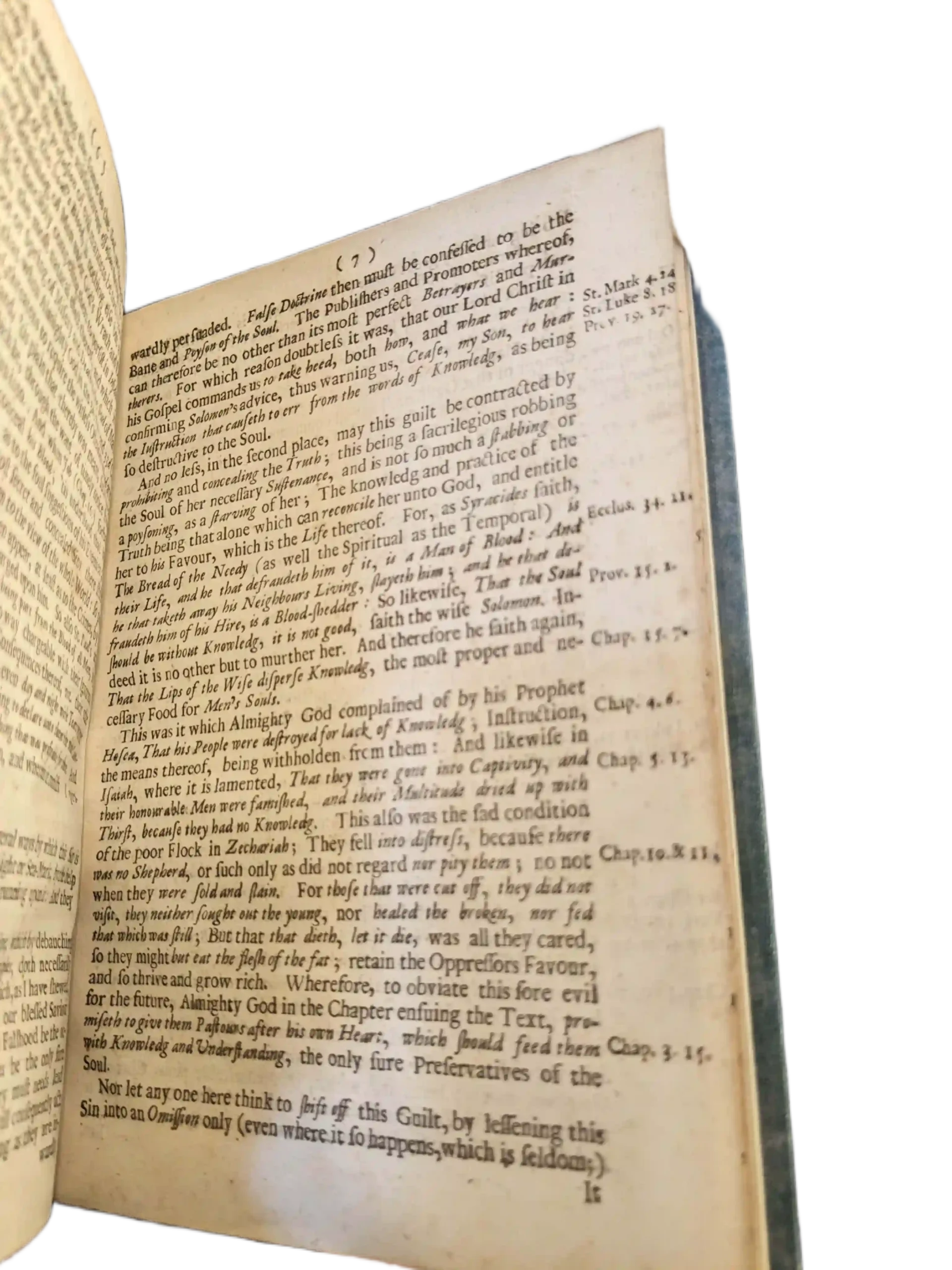
(7)
wardly persuaded. False Doctrine then must be confessed to be the
Bane and Poyson of the Soul. The Publishers and Promoters whereof,
can therefore be no other than its most perfect Betrayers and Mur-
therers. For which reason doubtless it was, that our Lord Christ in
his Gospel commands us to take heed, 77St. Mark 4. 24. both how, and what we hear:
confirming Solomon’s advice, 78St. Luke 8. 18. thus warning us, Cease, my Son, to hear
the Instruction that causeth to err from the words of Knowledg, 79Prov 19. 17. as being
so destructive to the Soul.
And no less, in the second place, may this guilt be contracted by
prohibiting and concealing the Truth; this being a sacrilegious robbing
the Soul of her necessary Sustenance, and is not so much a stabbing or
a poysoning, as a starving of her; The knowledg and practice of the
Truth being that alone which can reconcile her unto God, and entitle
her to his Favour, which is the Life thereof. For, as Syracides saith,
The Bread of the Needy (as well the Spiritual as the Temporal) is
their Life, 80Ecclus. 34. 21 and he that defraudeth him of it, is a Man of Blood: And
he that taketh away his Neighbours Living, slayeth him; and he that de-
fraudeth him of his Hire, 81Prov. 15. 2. is a Blood-shedder: So likewise, That the Soul
should be without Knowledg, it is not good, saith the wise Solomon. In-
deed it is no other but to murther her. And therefore he saith again,
That the Lips of the Wise disperse Knowledg, 82Chap. 15. 7. the most proper and ne-
cessary Food for Men’s Souls.
This was it which Almighty God complained of by his Prophet
Hosea, 83Chap. 4. 6. That his People were destroyed for lack of Knowledg; Instruction,
the means thereof, being withholden from them: And likewise in
Isaiah, 84Chap. 5. 13. where it is lamented, That they were gone into Captivity, and
their honourable Men were famished, and their Multitude dried up with
Thirst, because they had no Knowledg. This also was the sad condition
of the poor Flock in Zechariah; 85Chap. 10. & 11. They fell into distress, because there
was no Shepherd, or such only as did not regard nor pity them; no not
when they were sold and slain. For those that were cut off, they did not
visit, they neither sought out the young, nor healed the broken, nor fed
that which was still; But that that dieth, let it die, was all they cared,
so they might but eat the flesh of the fat; retain the Oppressors Favour,
and so thrive and grow rich. Wherefore, to obviate this sore evil
for the future, 86Chap. 3. 15. Almighty God in the Chapter ensuing the Text, pro-
miseth to give them Pastours after his own Heart, which should feed them
with Knowledg and Understanding, the only sure Preservatives of the
Soul.
Nor let any one here think to shift off this Guilt, by lessening this
Sin into an Omission only (even where it so happens, which is seldom;)
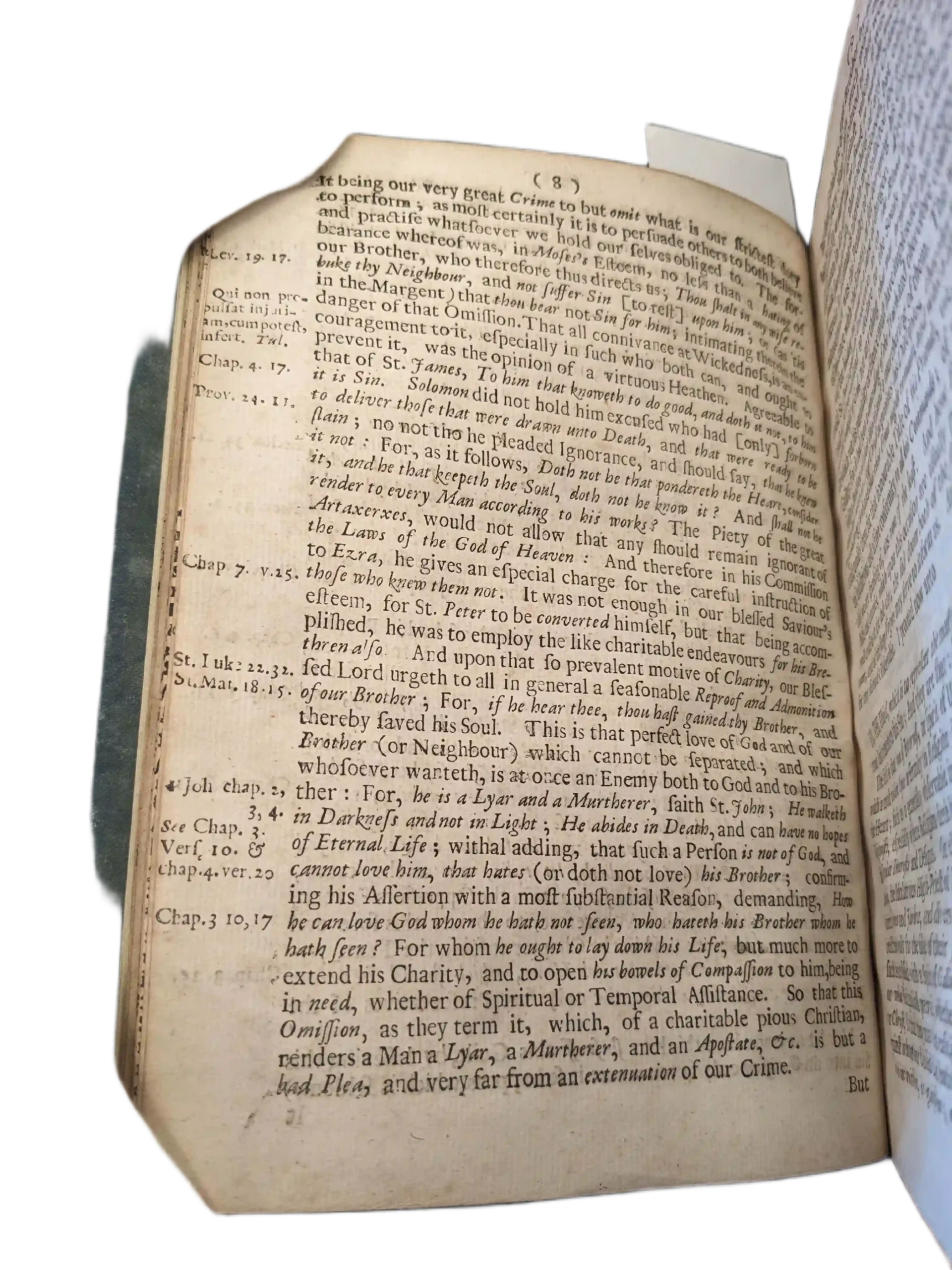
(8)
It being our very great Crime to but omit what is our strictest duty
to perform; as most certainly it is to persuade others to both believe
and practise whatsoever we hold our selves obliged to. The for-
bearance whereof was, in Moses‘s Esteem, no less than a hating of
our Brother, who therefore thus directs us; Thou shalt in any wise re-
buke thy Neighbour, 87Lev. 19. 17. and not suffer Sin [to rest] upon him; or (as ’tis
in the Margent) that thou bear not Sin for him; intimating therein the
danger of that Omission. 88Qui non prepulsat injusiamicum potest insert. Tul. That all connivance at Wickedness, is an en-
couragement to it, especially in such who both can, and ought to
prevent it, was the opinion of a virtuous Heathen. Agreeable to
that of St. James, To him that knoweth to do good, and doth it not, to him
it is Sin. 89Chap. 4. 17. Solomon did not hold him excused who had [only] forborn
to deliver those that were drawn unto Death, 90Prov. 24. 11. and that were ready to be
slain; no not tho he pleaded Ignorance, and should say, that he knew
it not: For, as it follows, Doth not be that pondereth the Heart, consider
it, and he that keepeth the Soul, doth not he know it? And shall not he
render to every Man according to his works? The Piety of the great
Artaxerxes, would not allow that any should remain ignorant of
the Laws of the God of Heaven: And therefore in his Commission
to Ezra, he gives an especial charge for the careful instruction of
those who knew them not. 91Chap 7. v. 25. It was not enough in our blessed Saviour’s
esteem, for St. Peter to be converted himself, but that being accom-
plished, he was to employ the like charitable endeavours for his Bre-
thren also. And upon that so prevalent motive of Charity, our Bles-
sed Lord urgeth to all in general a seasonable Reproof and Admonition
of our Brother; 92St. Luke 22. 32. For, 93St. Mat. 18. 15. if he hear thee, thou hast gained thy Brother, and
thereby saved his Soul. This is that perfect love of God and of our
Brother (or Neighbour) which cannot be separated; and which
whosoever wanteth, is at once an Enemy both to God and to his Bro-
ther: 941 Joh chap. 2, 3, 4. For, he is a Lyar and a Murtherer, saith St. John; He walketh
in Darkness and not in Light; 95See Chap. 3. He abides in Death, and can have no hopes
of Eternal Life; 96Vers. 10. & chap. 4. ver. 20 withal adding, that such a Person is not of God, and
cannot love him, that hates (or doth not love) his Brother; confirm-
ing his Assertion with a most substantial Reason, demanding, How
he can love God whom he hath not seen, who hateth his Brother whom he
hath seen? 97Chap. 3 10, 17 For whom he ought to lay down his Life, but much more to
extend his Charity, and to open his bowels of Compassion to him, being
in need, whether of Spiritual or Temporal Assistance. So that this
Omission, as they term it, which, of a charitable pious Christian,
renders a Man a Lyar, a Murtherer, and an Apostate, &c. is but a
bad Plea, and very far from an extenuation of our Crime.
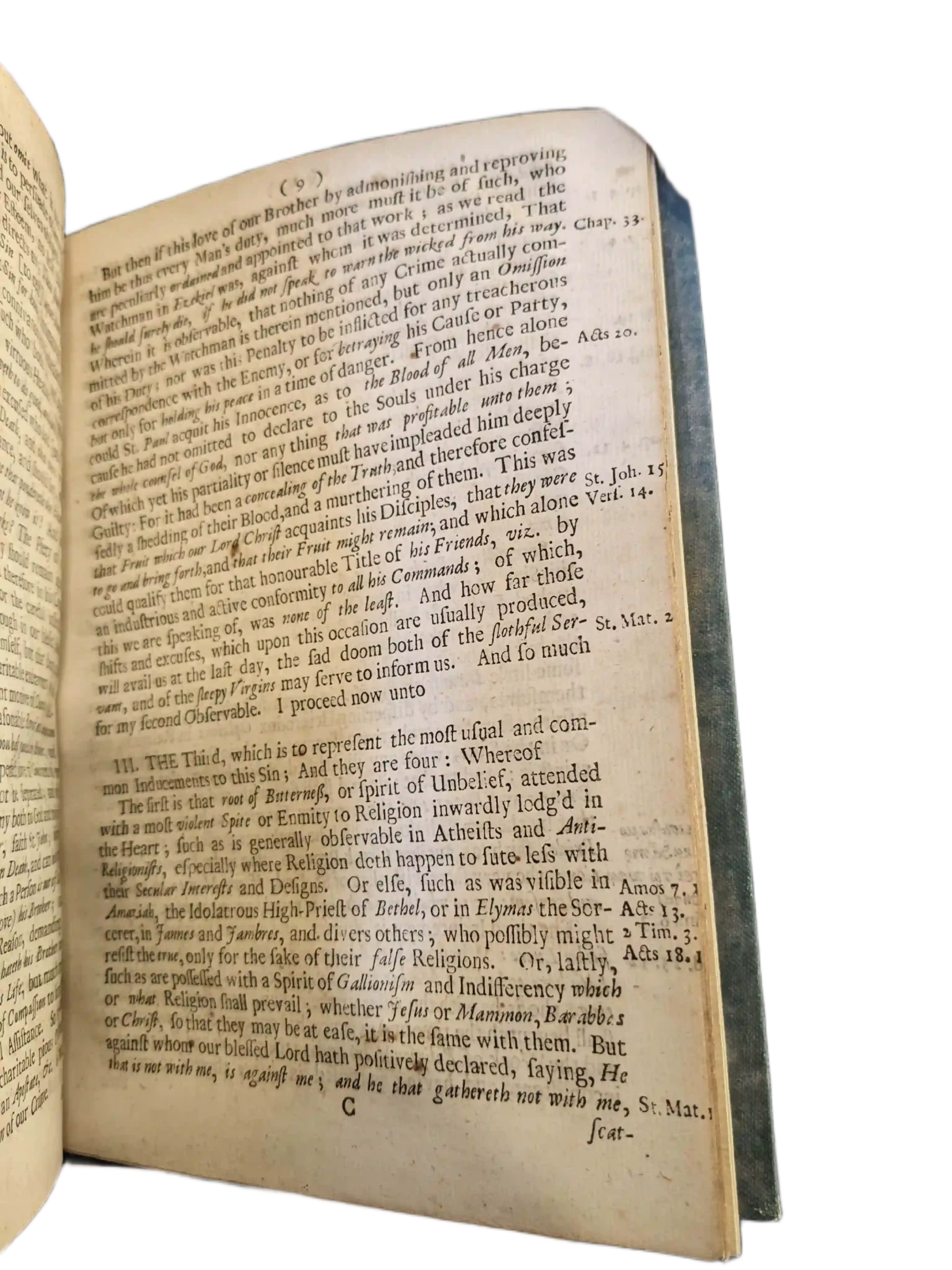
(9)
But then if this love of our Brother by admonishing and reproving
him be thus every Man’s duty, much more must it be of such, who
are peculiarly ordained and appointed to that work; as we read the
Watchman in Ezekiel was, against whom it was determined, That
he should surely die, 98Chap. 33. 8. if he did not speak to warn the wicked from his way.
Wherein it is observable, that nothing of any Crime actually com-
mitted by the Watchman is therein mentioned, but only an Omission
of his Duty; nor was this Penalty to be inflicted for any treacherous
correspondence with the Enemy, or for betraying his Cause or Party,
but only for holding his peace in a time of danger. From hence alone
could St. Paul acquit his Innocence, 99Acts 20. as to the Blood of all Men, be-
cause he had not omitted to declare to the Souls under his charge
the whole counsel of God, nor any thing that was profitable unto them;
Of which yet his partiality or silence must have impleaded him deeply
Guilty: For it had been a concealing of the Truth, and therefore confes-
sedly a shedding of their Blood, and a murthering of them. This was
that Fruit which our Lord Christ acquaints his Disciples, 100St. Joh. 15. 16. that they were
to go and bring forth, 101Vers. 14. and that their Fruit might remain; and which alone
could qualify them for that honourable Title of his Friends, viz. by
an industrious and active conformity to all his Commands; of which,
this we are speaking of, was none of the least. And how far those
shifts and excuses, which upon this occasion are usually produced,
will avail us at the last day, 102St. Mat. 25. the sad doom both of the slothful Ser-
vant, and of the sleepy Virgins may serve to inform us. And so much
for my second Observable. I proceed now unto
III. THE Third, which is to represent the most usual and com-
mon Inducements to this Sin; And they are four: Whereof
The first is that root of Bitterness, or spirit of Unbelief, attended
with a most violent Spite or Enmity to Religion inwardly lodg’d in
the Heart; such as is generally observable in Atheists and Anti-
Religionists, especially where Religion doth happen to sute less with
their Secular Interests and Designs. 103Amos 7. 12. Or else, such as was visible in
Amaziah, 104Acts 13. the Idolatrous High-Priest of Bethel, or in Elymas the Sor-
cerer, 1052 Tim. 3. 8. in Jannes and Jambres, and divers others; 106Acts 18. 17. who possibly might
resist the true, only for the sake of their false Religions. Or, lastly,
such as are possessed with a Spirit of Gallionism and Indifferency which
or what Religion shall prevail; whether Jesus or Mammon, Barabbas
or Christ, so that they may be at ease, it is the same with them. But
against whom our blessed Lord hath positively declared, saying, He
that is not with me, 107St. Mat. 12. 30. is against me; and he that gathereth not with me,
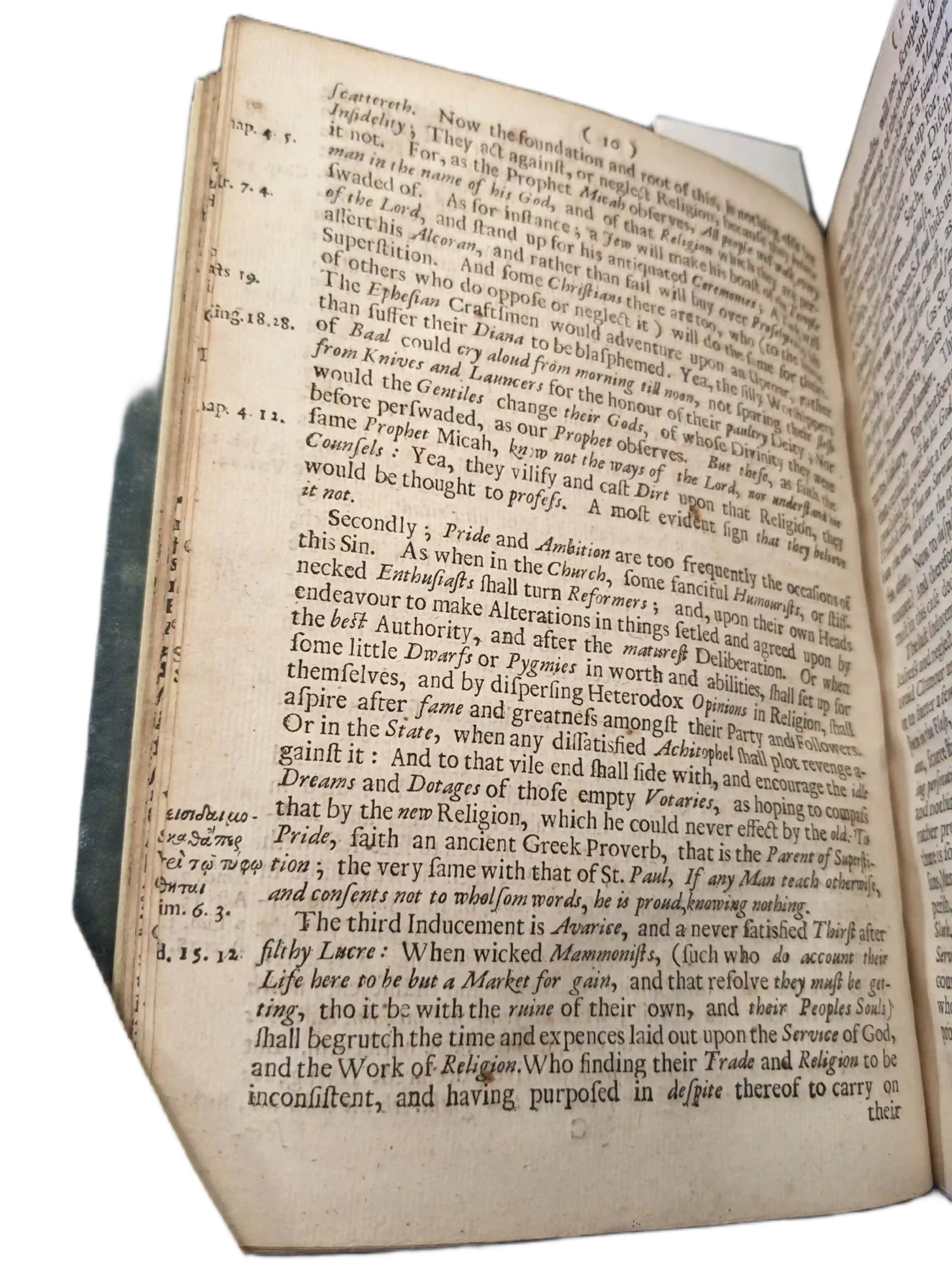
(10)
scattereth. Now the foundation and root of this, is nothing else but
Infidelity; They act against, or neglect Religion, because they believe
it not. For, as the Prophet Micah observes, All people will walk every
man in the name of his God, 108Chap. 4. 5. and of that Religion which they are per-
swaded of. As for instance; a Jew will make his boast of the Temple
of the Lord, 109Jer. 7. 4. and stand up for his antiquated Ceremonies; A Turk will
assert his Alcoran, and rather than fail will buy over Proselytes to his
Superstition. And some Christians there are too, who (to the shame
of others who do oppose or neglect it) will do the same for theirs.
The Ephesian Craftsmen would adventure upon an Uproar, 110Acts. 19. rather
than suffer their Diana to be blasphemed. Yea, the silly Worshippers
of Baal could cry aloud from morning till noon, 1111 King. 18. 23. not sparing their flesh
from Knives and Launcers for the honour of their paultry Deity; Nor
would the Gentiles change their Gods, of whose Divinity they were
before perswaded, as our Prophet observes. But these, as saith the
same Prophet Micah, 112Chap. 4. 12. know not the ways of the Lord, nor understand his
Counsels: Yea, they vilify and cast Dirt upon that Religion, they
would be thought to profess. A most evident sign that they believe
it not.
Secondly; Pride and Ambition are too frequently the occasions of
this Sin. As when in the Church, some fanciful Humourists, or stiff-
necked Enthusiasts shall turn Reformers; and, upon their own Heads
endeavour to make Alterations in things setled and agreed upon by
the best Authority, and after the maturest Deliberation. Or when
some little Dwarfs or Pygmies in worth and abilities, shall set up for
themselves, and by dispersing Heterodox Opinions in Religion, shall
aspire after fame and greatness amongst their Party and Followers.
Or in the State, when any dissatisfied Achitophel shall plot revenge a-
gainst it: And to that vile end shall side with, and encourage the idle
Dreams and Dotages of those empty Votaries, as hoping to compass
that by the new Religion, 113[〈 in non-Latin alphabet 〉] 1 Tim. 6. 3. which he could never effect by the old. ‘Tis
Pride, saith an ancient Greek Proverb, that is the Parent of Supersti-
tion; the very same with that of St. Paul, If any Man teach otherwise,
and consents not to wholsom words, he is proud, knowing nothing.
The third Inducement is Avarice, and a never satisfied Thirst after
filthy Lucre: 114Wisd. 15. 12. When wicked Mammonists, (such who do account their
Life here to be but a Market for gain, and that resolve they must be get-
ting, tho it be with the ruine of their own, and their Peoples Souls)
shall begrutch the time and expences laid out upon the Service of God,
and the Work of Religion. Who finding their Trade and Religion to be
inconsistent, and having purposed in despite thereof to carry on
References
Collections
Tags
Wood, Betty. 2004 “Godwyn [Godwin], Morgan” Oxford Dictionary of National Biography
Davis, David B., The Problem of Slavery in Western Culture (Oxford, 1988)
Vaughan, Alden T., “Slaveholders’ ‘Hellish Principles’: A Seventeenth-Century Critique,” in Roots of American Racism (New York, 1995), 55-81
- Godwyn, Morgan. Trade Preferr’d before Religion, and Christ Made to Give Place to Mammon: Represented in a Sermon Relating to the Plantations. First Preached at Westminster-Abby, And Afterwards in Divers Churches in London. (London: Printed for B. Took at the Ship in St. Paul’s Church-yard, and for Isaac Cleave at the Star in Chancery-Lane, 1685.)
- Rare Books Collection ( BV2757 .G62 ), Special Collections Research Center, William & Mary Libraries
- Transcription by Michael Becker and Dylan Bails.
Footnotes
- 1Rom. 14. 15, 20.
- 2Esther 4.14.
- 3Howell’s Fam. Letters Vol. I. §. 3. Lett. 33.
- 4Acts 13.6, & &c. Bar-Jesus, or Elymas, did oppose Christianity, as not believing it; but these whilst they profess it, do yet oppose it.
- 5Prov. 31. 8.
- 6Alienus ab ira, alienus à justitia
- 7Psal. 39. 3.
- 8Job 13. 13.
- 9Mic. 3. 8.
- 10Isa. 62.6,7.
- 11St. Mat. 21. 28.
- 12St. Luke 18. 5.
- 13Viz. In the Negro`s and Indian`s Advocate, p. 111.
- 14See Mr. Ricaut’s Maxims of the Turkish Policy, wherein he often mentions the Turks Zeal to promote their Fath. Also Pet. Daniel, in his History of Barbary, tells us, That the Turks will shew you kindness, to make you embrace their Religion. Pag. 308, 309, 310, 311.
- 15Quest. By what Authority or Law, he could do this to that or any other Person?
- 16In his Temple.
- 17Impii impie agent, nec intelligent. Dan. 12.
- 18Phil. 2. 21. All seek their own, &c.
- 19Plerique rei difficultates causantur, socordiam ignaviamq; suam cum accusare potius, ac dolere deberent. Acost. de proc. Ind. Sal. l. 3. c. 22.
- 20Acts 28.22.
- 21They say, and do not, Mat. 23. 3. Si non reipsâ tibi dolet, at dissimulare certe est hominis. Ter. Isa. 63. 5.
- 222 Tim. 4. 16.
- 23Reply to his Reflections on the Rector of Sutton, p. ult.
- 24Acts 13. 46. & 28. 28.
- 25Prov. 26. 12. Chap. 3. 6.
- 26Acts 28.
- 27Mart. Ep.
- 28Viz. In the East-Indies.
- 29[〈 in non-Latin alphabet 〉], The Hypocrite will always find an Excuse.
- 30Eccl. 32. 15, 17
- 31Phil. 1. 15, 18.
- 32Gal. 1. 10.
- 33Be not ye the Servants of Men.
- 34Rom. 15. 2.
- 35St. Mat. 3.
- 36For by our Spirit we are all baptized into one Body, whether we be Jews or Gentiles, whether we be Bond or Free: and have been all made to drink into one Spirit, saith St. Paul, 1 Cor. 12. 13. See also Chap. 7. 20, 21, 22, & 24. See also Ephes. 6. 5, 6. & Col. 3. 22. & 1 Tim. 6. 1. 1 St. Pet. 2. 18, &c.
- 37See A. B. Abbot’s History of the New World, where he makes often mention of the Jesuits and Friars labours in this kind in America; A Prelat that was never suspected for any friend to them.
- 38Si tibi displiceant, fac meliora, precor.Mart. Ep.
- 39Rom. 8. 9.
- 401 Cor. 16. 22.
- 411 Cor. 13. 2, 3.
- 42Wisd. 17. 11.
- 43Job 29. 11, 12, 13, &c.
- 44Ch. 5. v. 22, &c.
- 45Chap. 1 ver. 5, 7.
- 46Vers. 9.
- 47Vers. 18.
- 48Vers. 19.
- 49Chap. 2. 4.
- 50Vers. 7, 20.
- 51Vers. 21.
- 52Vers 5.
- 53Vers. 11.
- 54Hâc tuâ impudentiâ qua omnes superas, etiam improbissimos doces improbitatem.
- 55Jun.
- 56Vers. 33.
- 57Vers. 7.
- 58Vers. 23, 35.
- 59Non sun̄t clām peccata tua ut pervestigatione sit opus, palam sunt, omnium oculis exposita. Idem.
- 60Quid bonam praedicas viam tuam? Vulg. Ed.
- 61Quid niteris bonam ostendere viam tuam? Jun. Why TRIMMEST thou thy way? vers. 33.
- 62Chap. 10. 6.
- 631 Thess. 2. ver. 15. 16.
- 64[〈 in non-Latin alphabet 〉] &c. Hom. Il. [?].
- 65Ezek. chap. 3. 18. & 33.
- 66Sanguis animarum egentium [sanguis] innocentium. Trem. Sanguis animarum pauperum & innocentium, Vulg. Ed.
- 67Gen. 9 4.
- 68Psal. 36. 9.
- 69Chap. 20. 6, 14.
- 70Rom. 9. 3.
- 71vers. 32.
- 72Vers. 18.
- 73Acts 20. 26.
- 74Vers 31.
- 75Vers. 20, 27.
- 76St. Joh. 8. 32
- 77St. Mark 4. 24.
- 78St. Luke 8. 18.
- 79Prov 19. 17.
- 80Ecclus. 34. 21
- 81Prov. 15. 2.
- 82Chap. 15. 7.
- 83Chap. 4. 6.
- 84Chap. 5. 13.
- 85Chap. 10. & 11.
- 86Chap. 3. 15.
- 87Lev. 19. 17.
- 88Qui non prepulsat injusiamicum potest insert. Tul.
- 89Chap. 4. 17.
- 90Prov. 24. 11.
- 91Chap 7. v. 25.
- 92St. Luke 22. 32.
- 93St. Mat. 18. 15.
- 941 Joh chap. 2, 3, 4.
- 95See Chap. 3.
- 96Vers. 10. & chap. 4. ver. 20
- 97Chap. 3 10, 17
- 98Chap. 33. 8.
- 99Acts 20.
- 100St. Joh. 15. 16.
- 101Vers. 14.
- 102St. Mat. 25.
- 103Amos 7. 12.
- 104Acts 13.
- 1052 Tim. 3. 8.
- 106Acts 18. 17.
- 107St. Mat. 12. 30.
- 108Chap. 4. 5.
- 109Jer. 7. 4.
- 110Acts. 19.
- 1111 King. 18. 23.
- 112Chap. 4. 12.
- 113[〈 in non-Latin alphabet 〉] 1 Tim. 6. 3.
- 114Wisd. 15. 12.